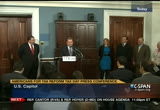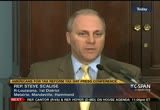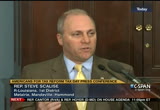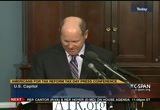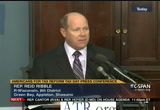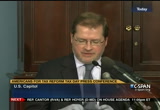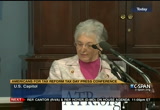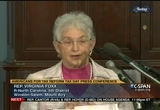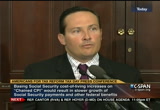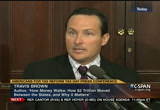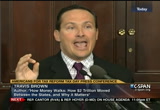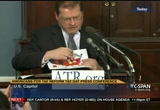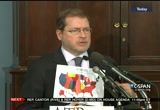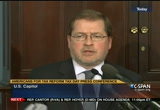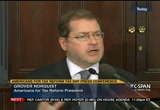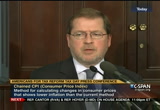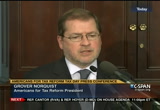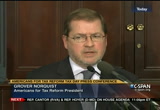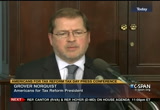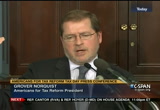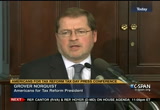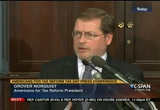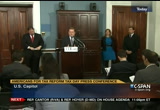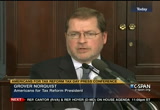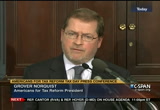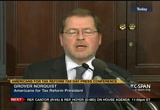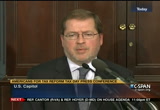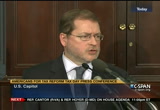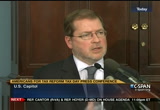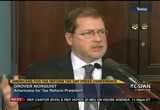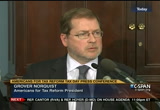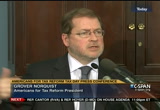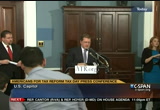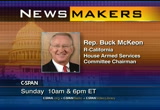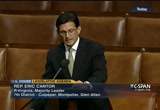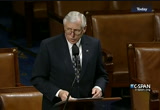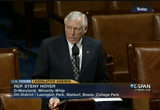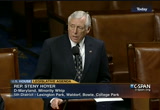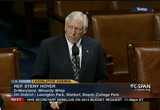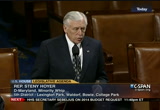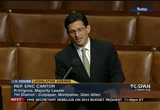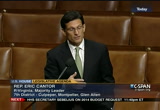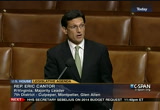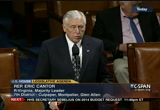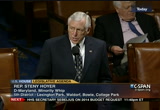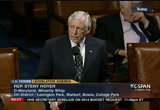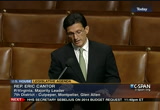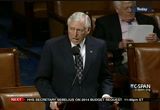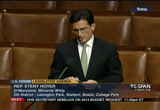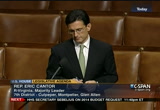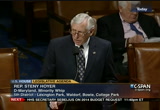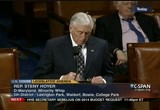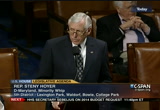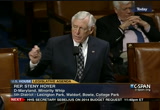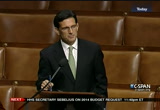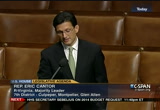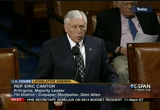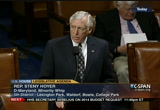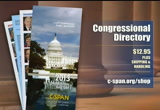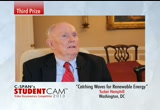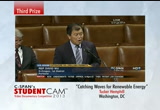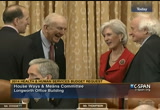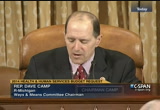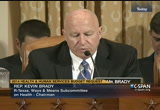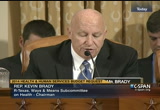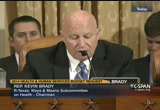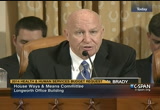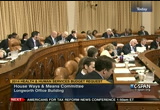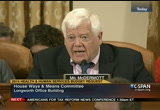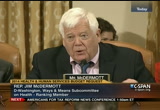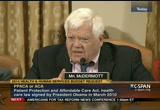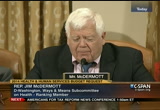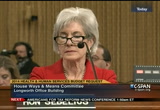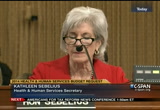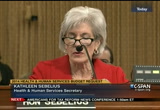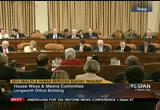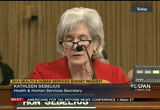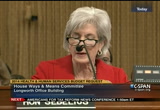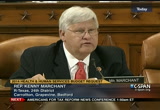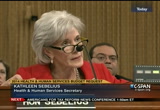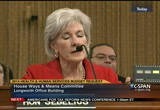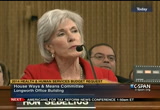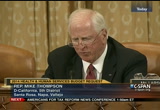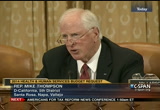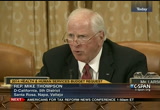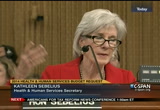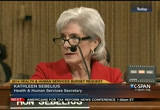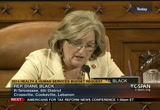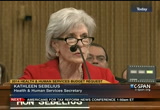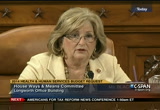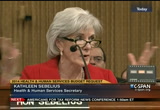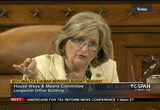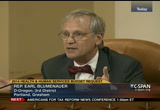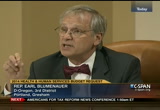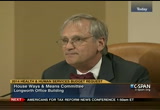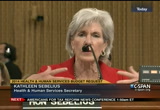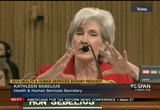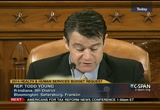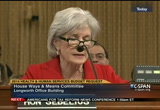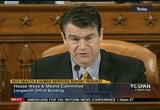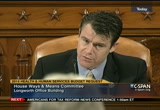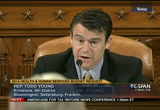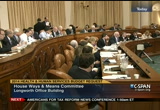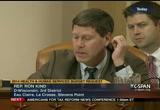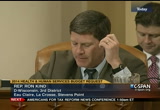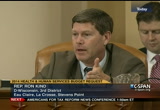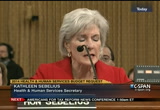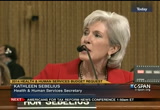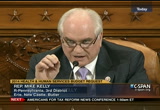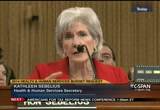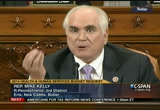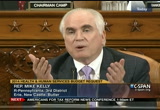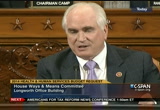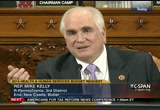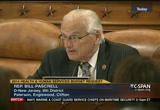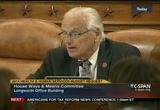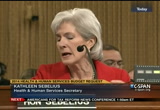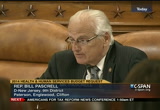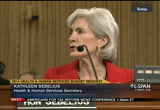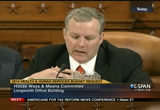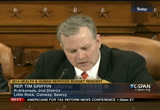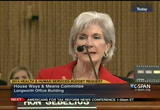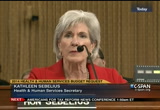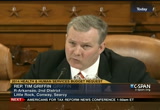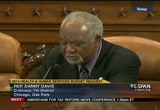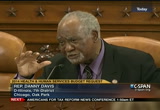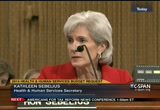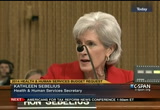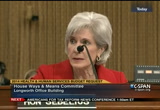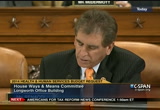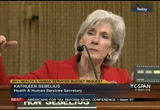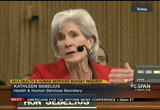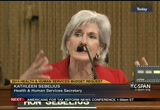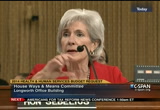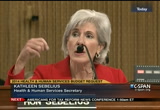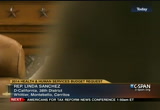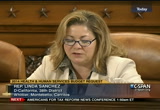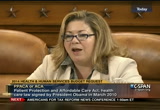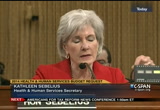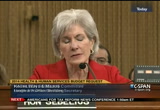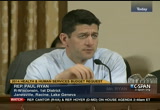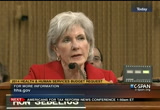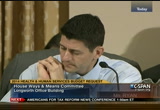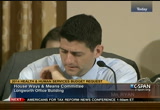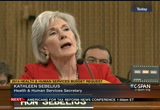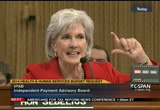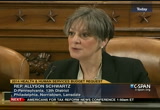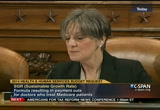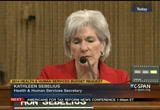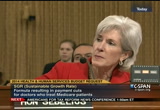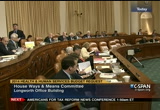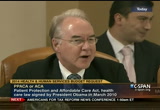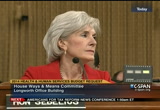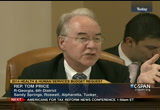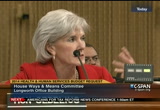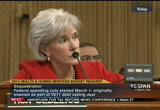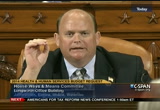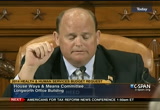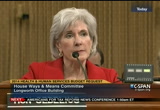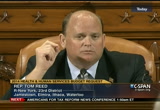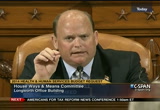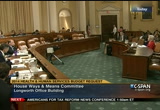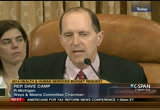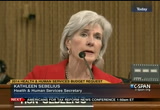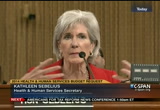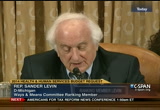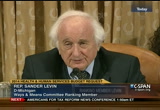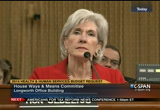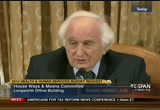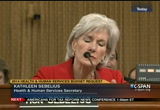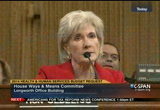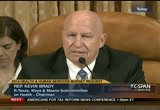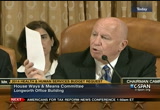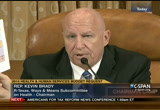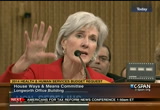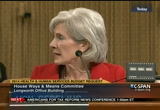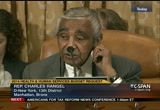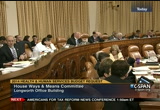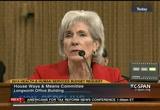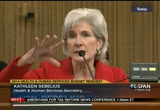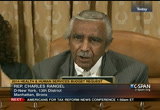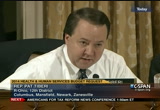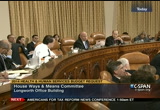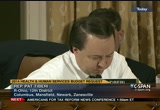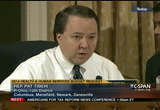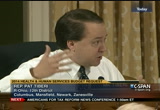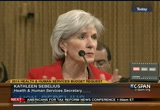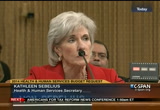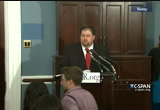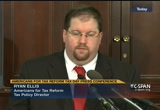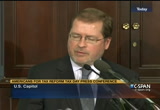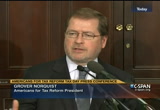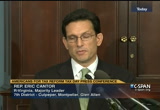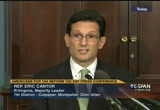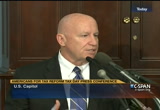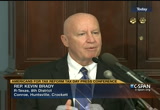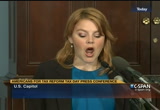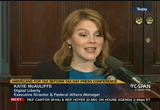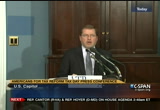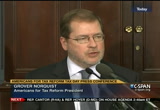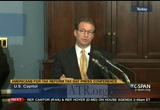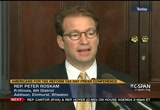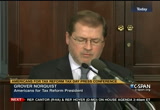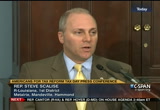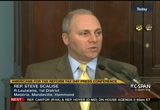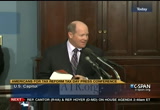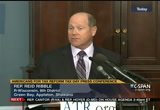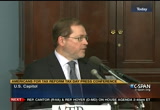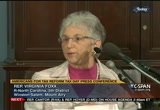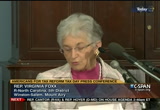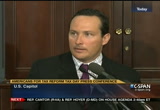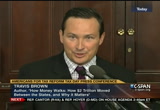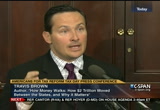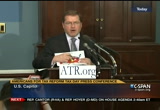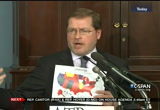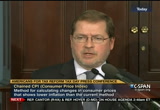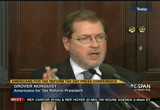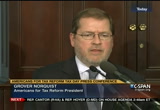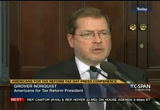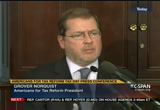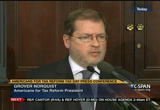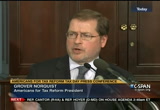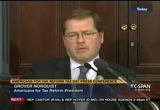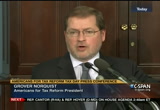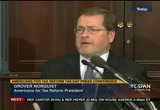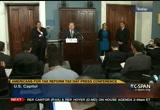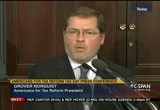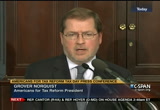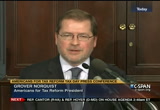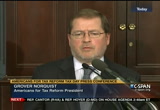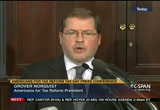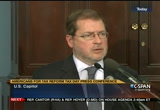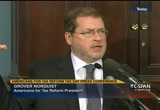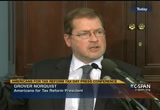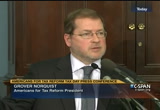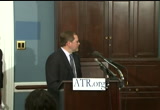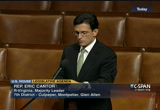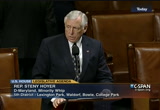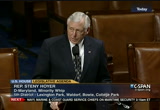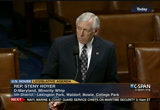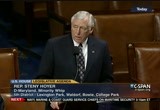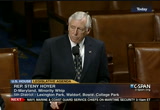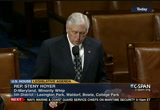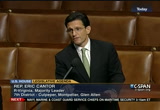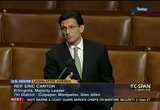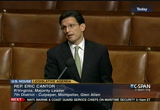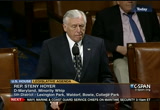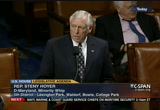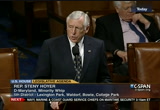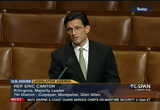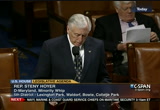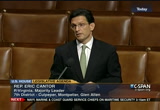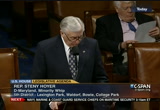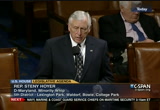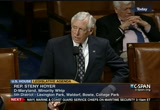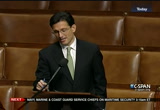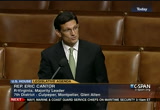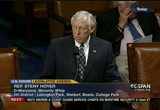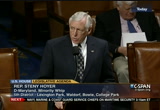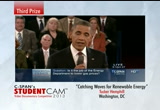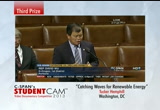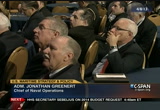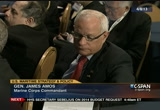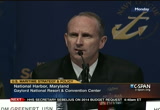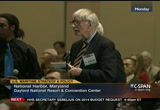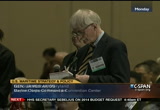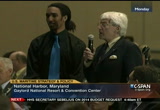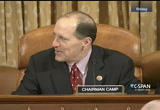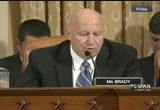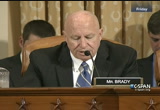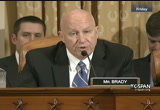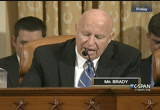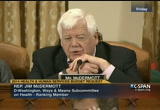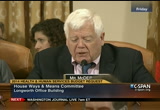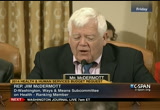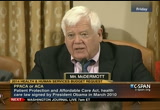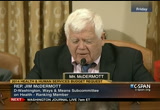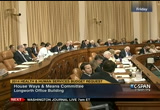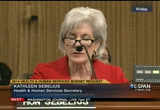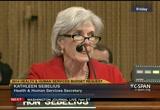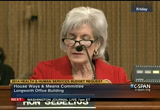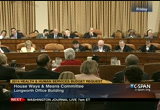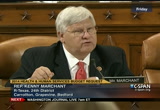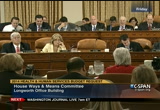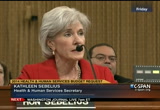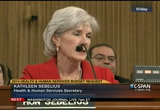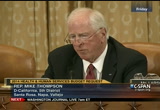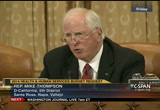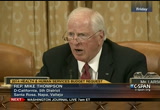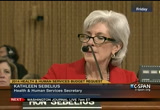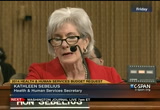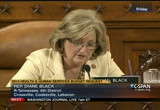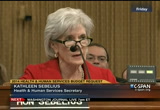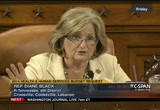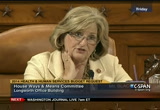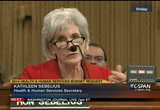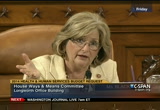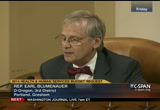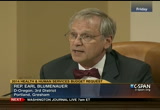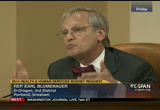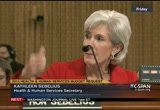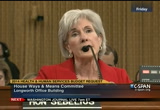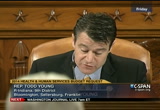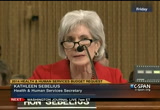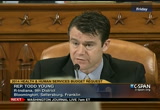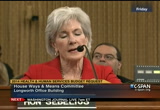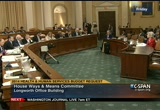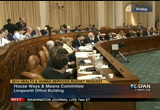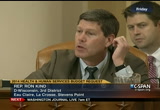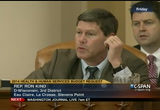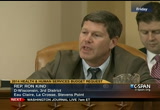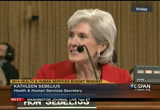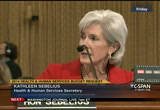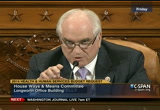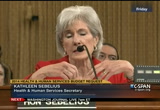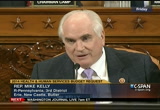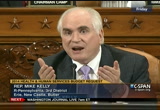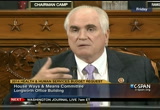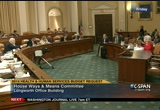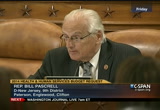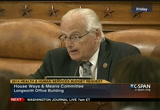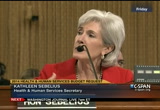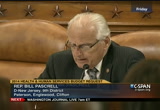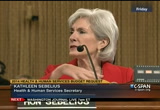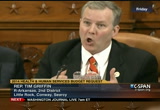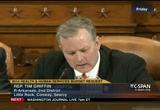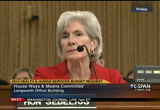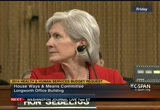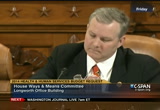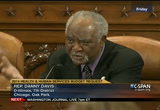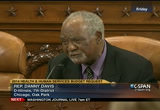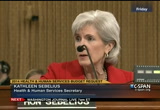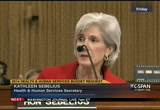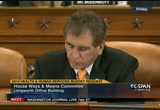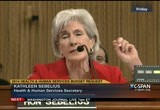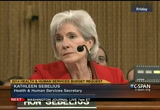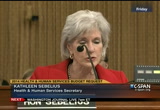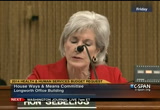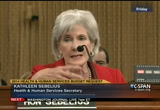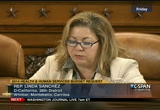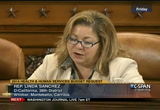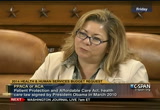tv Politics Public Policy Today CSPAN April 12, 2013 10:30pm-6:00am EDT
10:30 pm
would have him again. if i can ask the chairman of the republican study committee. >> thank you, grover for your leadership and the fight against higher taxes. as we can see yet again this week, by the submission of his budget, which was 65 days late. president obama wants to raise taxes so he can grow government even more. not only do we balance in 10 years in the house's budget we get the economy moving again without raising taxes. when you look at the senate budget and the president's budget they raise taxes by $1 trillion and never get to balance. it show you the choice of two different approachs. we've been calling for pro-growth tax reform that lowers overall rates so we can get the economy moving again and create jobs. it has been proven to work every time it's tried and i'm encouraged that the full committee is committed to moving
10:31 pm
on tax reform that actually gets our economy moving again. if you look at what the president has been doing on taxes, he loves hiding behind straw men and calling taxes on millionaires and billionaires but if you look at the details it hits hard-working middle-class families in the gut. just last week the president was on billionaires row in san francisco raising more money from his millionaire and billionaire friends. when the president parties with million nares and rock stars he denies that same right to hard-working taxpayers and school groups. so what we're going to file again on monday is the buffet rule. i'm going to file it in the house and the senator will file it in the senate. it says if people like warren buffet feel like they are not paying enough in taxes, put your
10:32 pm
money where your mouth is and there will be a check off box to send in as much money as you want. it will be used to pay down the national debt. we'll see if anyone wants to put their money with we're their mouth is. so the buffet rule will be filed on monday. so grover, thank you for your leadership. >> everyone should read warren buffet's early writings when he started to become a millionaire. he seemed to have forgotten about it in the later years. he was right at the time. we're joined by congressman from the great state of wisconsin. >> good morning, everybody. it has been interesting more me as a former businessman to come to congress two years ago and listen to the talk about taxes and tax code. you hear our colleagues on the left saying that the rich don't
10:33 pm
pay their fair share. corporations don't pay their fair share. then you hear people on our side say that is not problem. the problem is that the 47% don't pay income tax at all. there are only partial trues in any of that. the real problem is this. this is the problem. this is the i.r.s. tax code. it is filled with so much complexity that fiscal year 2008, the i.r.s. received more than 160 million phone calls trying to get answers about how to do their taxes and they were only able to answer 53% of them. ladies and gentlemen, this is the problem. we can talk about raising taxes, lowering taxes, at the end of the day the products that the government provides is just that, they are products, they are services. when my colleagues on the left
10:34 pm
say we need of the raise the price. when g.m. went bankrupt the first thing they did was simplify the sale. 0% interest, 0% down. they reduced the price and that brought in revenue so that the manufacturing business could be saved. these are economic principles that are so simple that every single american understands. for some reason policy writers here in washington don't. a.t.r. does. i thank grover for the work you're doing and i hope we can continue to work for real tax reform so the american people don't have to deal with this anywhere. thank you. >> the reason why the i.r.s. gets the phone calls because it is not safe to send them e-mails. [laughter] we're joined by virginia fox from north carolina.
10:35 pm
>> well, the good thing about being last is it's -- you don't have a lot to say because everything has been said. but -- it's hard to repeat it all. but i wanted to point out -- i was going to say in some of my comments that the tax code is four times more than our bible. if you look at it, not only is this impossible in terms of the size of it but look at the fine print. it is impossible to read. so not only is this huge in terms of numbers of pages, but the print is fine. the real left -- heft of what we're dealing with. something that has been little mentioned though is the amount of time that people have to spend working on their taxes.
10:36 pm
as the majority leader mentioned, it is the weekend before tax day on monday, i'm sure all of you know lots of people who are spending this weekend working on filling out their taxes. they are gathering up their receipts. a minimum of 13 hours is what the average person spends on trying to comply with the tax code. oner % of us find it so rouse that we can't do it ourselves and we hire someone else to do it. think of what you could do with those 13 hours. you can drive to disney world from here. you can have a really good time. you can spend time with your kids. you can spend time with your family. most of us find our time extraordinaryly precious. i know i do. i don't want to spend my time filling out my taxes. another point that is not made, americans are spending more on
10:37 pm
taxes than food, clothing, and housing all put together. what a shame. what an indictment of a society when that is the case. that should not be. that absolutely should not be. we should be working to lighten that burden and we are. republicans are doing everything that we can to lighten the burden. one of my colleagues said economy growth is foundational to the country's continued prosperity. until we revise the tax code, until we have a simpler, fairer tax code we are simply not going to see the economic growth that we need. tax -- our tax code should not require taxpayers to own the secret dechord ring to figure out how to do their taxes. we need a simpler code. with republicans we will have that. thank you very much, grover.
10:38 pm
> thank you. congresswoman, you are not the last speaker. travis brown is here who is the author of "how money walks." we can in washington, d.c. think about federal taxes, state taxes matter a great deal as well. somebody who has studied this and helps lead to fight in changing it state by state, travis brown. >> thanks, grover. if you want to look at the roadway and the path forward on national tax reform start by looking at leadership happening right now within the states. for the first time in a long time, we've gotten something rom the internal revenue service shows exactly how taxpayers are moving between and
10:39 pm
among across the states. we're talking about how money walks.com the availability to track over the previous 15 years exactly what tax policies at the state level have been popular measured by real responses by voters moving their homes and their pocket books to states. generally, what we find across all 50 states is that taxpayers are fleeing the high-tax states and flock to the low-tax states. why would that be the case? the price of work at the state level is varyible compared to the price of work we put and impose on our federal tax code just mentioned, being fixed. that means it is no surprise when you look at the nine states in america that have not had a personal income tax their price of work is up to 13.3% now
10:40 pm
thanks to california, lower than the price of work elsewhere. $146 billion being gained in gross income in those nine states without a personal income tax and the reverse is also true. the nine states with if highest personal income tax rate or per capita income tax burden lost $130 billion between 1995 and 2010. there is no reason to guess and wonder what principles and programs should go into our national tax reform system. you can turn to the state and see the result on state revenue growth and state product growth and exactly on how our taxpayers are moving, migrating away from california, new york, and illinois and moving to places like texas, tennessee, and
10:41 pm
florida. finally, there's a reason and all this information is available at the county, city, nd state level by going to www .howmoneywalks.com. finally there is a reason to remind us that we should turn to our governors who celebrate independence day and not the anniversary of our national income tax. >> thank you very much. your point on state taxes is very important. there's real differences among the 50 or 57 states. in those states that are deciding on reform and not raise taxes, california, maryland, illinois, d.c., -- unfortunately, d.c. too, massachusetts things are dramatically different than in states like louisiana. that governor is looking to
10:42 pm
abolish the state income tax. nsas is also working to faze out its state income tax and in north carolina the state legislature is moving to abolish the state income tax business and individual taxes in those three states we're seeing governors pushing for cuts in the income tax wisconsin, michigan, idaho, ohio and a number of other states. there's very dramatic difference. in d.c., they talk about gridlock, the two parties trying to go in opposite direction. in the states, because so many have united democrat or republican control, the states are actually passing legislation, a number of the states higher and higher taxes, a number of states lower taxes and looking to abolish the state income tax. we're going to be able to see what works. do people move from illinois to
10:43 pm
indiana or from indiana to illinois. what happens there? with that, we take a question or two if there are additional thoughts. we had great presentation from our congress-time peep. yes? >> i have a white house question. the changed c.p.i. issue that a lot of democrats have come out against. i just want to get your take if you support the idea of chained c.p.i. in that context? >> chained c.p.i. is the idea of two changes. one is it reduces the benefits that people would have when they retire. reduce the benefits so they wouldn't grow as rapidly because they are indexed to inflation. it uses an inflation rate that is lower. so it reduces spending. about $100 billion over a decade. but the other half of it, which is why you get different people
10:44 pm
objecting to it for different reasons, the other part of chained c.p.i., it brings back what we thought we we got rid of under reagan. back in the 1970's when the government infreighted the currency and everyone was getting higher wages because you were getting paid more dollars that was worth less. in 1978, ent up 10% 1979, 1989, your pay went up 10%, inflation went up 10%. but the government said you're in a higher tax back cat. that is what bracket creep is. t pushes you in a higher tax bracket but it is because of change in inflation. it reduces the growth of some benefits in social security and brings back partial bracket
10:45 pm
creep. i think that bracket creep was a bad way for the government to raise money. the government inflates the currency, you didn't do that. some third party did it, they printed more money, they were responsible for pushing you into another tax bracket that you were not better off than you before then they take a higher percentage of your income because they are treating you as if you were rich people. the money is worthless. that's why some people look at and we're against it because its is a benefit cut and some people look at it and say we're against it because it is a sneaky way to raise taxes. my concern is that changed c.p.i. is what the administration has chose on the throw out like marbles at everyone's feet to ignore the fact that for four years they have had no recommendations
10:46 pm
written down to reform entitlements. the republican house has three times passed the ryan budget. it gets significant savings by reforming entitlement, not cutting them but reforming as clinton signed the legislation in 1996 to blockade to families with dependent children. when he did that, we saved money, child poverty fell. we ended up with 50 states taking different approaches on how to help people with welfare so we had fewer people who did not need other people's tax money. that reform was helpful. that is central to the entitlement reforms that the republican house has passed. what the president hasn't done is put together a budget that is as well-thought-out as ryan's certainly has not saved the same amount of money. what ryan has put forward in
10:47 pm
this town you can save money without raising taxes. the house has voted for a budget that balances in 10 years, not reduces the growth of debt over 10 years without a single tax increase. the president's budget raises taxes dramatically and never lances out in the history of the world forward. it does not balance in 10, 20, or 100. we have entitlement reform that has been voted and passed by one body. the president through throws it out and hoping that the republican will say something nice about the hidden tax increase. if the president wants to be for entitlement reform he would go to the democratic senate and say let's come um with something that i can sign and you can pass then you can go to the republicans and say we have an
10:48 pm
entitlement reform, how about you? but close to zero democrats will vote for the president's budget. it is not serious. >> [unintelligible] >> there are two parts to it that don't have to be attached. one is the reduction in growth of spending. that is not how i will reform entitlements. i think the approach of reforming then rather than just nipping at them is a better proposal. chained c.p.i. because it is $100 billion tax increase, at least and it grows in out years, unless it was matched by a tax cut similar or larger size in the same bill it would be a tax increase. the house does not vote for a tax increase and i don't think the senate will vote for a tax increase. they are not going to vote for one between now and 2014.
10:49 pm
>> i wanted to get your opinion on president obama and his budget. [unintelligible] the chairman says it is a good first step but i wanted your reaction? >> if the president is willing to do revenue neutral tax reform, that's a huge step in the right direction. all of it is -- i have not heard it as definitively as he may have said it. >> [unintelligible] >> as with the other question, half of it is a guide idea and the other half is problematic. the good eye is that the american income tax is 35% at the national level. you add 4% at the state level. we're at 39% at corporate income tax. when you go to other countries, people we made fun of because they tax themselves oddly and don't have growth, you have in e european community 25%
10:50 pm
marginal average tax on businesses. american companies are carrying a 39% dead weight loss from our corporate, federal, and state income taxes and they compete with people with an average of 25% dead weight cost on their earnings. of course, the eastern europeans are lower than 25%, the younger more vibrant guys who are closer to remembering what real socialism looks like. how do we compete in the world at 35? that is not sustainable. they should go to 25 because that will get you more growth and more revenue than trying to figure out how to fiddle on the other stuff. the real danger is do you want to take general motors and fortune 500 companies from 35 to 25 and leave every small business in the country at 44? right, because personal income
10:51 pm
taxes, a lot of american companies are a sub chapter s. smaller businesses, mom and pop shops pay personal income taxes, as if they were a company. so you take away from them the credits and they don't get lower rates. this can be done in a way that damages small and independent businesses by keeping their rates high, higher than international averages and higher than large corporations they compete with. and while the corporations have some of their deductions and credits taken away, it is replaced by lower rates. then the independent small businessmen and women have fewer deductions and credits and higher rates than what they had in the past. you can get into the weekend weeds on this and -- weekends on -- i think you
10:52 pm
can do a corporate income tax. you kind of have to do both at the same time. or if you don't, you have to recognize that if you're taking away credits and deductions on one side and leaving the rates up there, it is not revenue neutral overall. >> so you would not be sp supportive of doing a corporate tax reform that is revenue neutral? it has to be comprehensive that includes the individual side as well? >> as long as it is revenue neutral you can make it revenue neutral on the corporate side and not on the individual side. so as long as the whole thing is revenue neutral it would be fine for people who made the pledge to their voters, the taxpayer protection pledge. they told their voters they are not raising their taxes.
10:53 pm
tax reform is fine and consist went the commitment they made to voters. i think there's a challenge of corporate only. it's not impossible to do but it could be difficult and you have to check that you're not disadvantaging smaller companies by making them wait on tax reform. yes? >> shift gears a little bit. in the real politics of washington. you're not getting the president to change his mind. does obama really want a budget to pass or does he want the tax issue so he can help the dccc elect more democrats in congress? does he want a budget or does he want the issue? >> i think a smart elected official would go -- assume it could be either. talk to him and check out if he's on the up and up on some of the budget stuff. in which case, yes. be aware that might not be the
10:54 pm
case and you should be careful about that as well. you don't want to walk down a conversation that starts with tax increases that can grow and grow and dominate the conversation. the arguement that the president can't be bent to the will of the american people is counter factual. i spent most of 2011 and part of 2012 being told by all the smart people in the world that there is no way to get a $2.5 trillion reduction in the next decade on spending. t has to be part tax increase, part reduction in order to get the deficit reduction that was demanded by the republicans in the house to increase the debt ceiling. at the end of the day, we got $2.5 in spending. restrapets that was the cap and the sequester. there's been repeated efforts by
10:55 pm
democrats in the senate and the white house to undue that agreement of august 2011, but it has held. the sequester is holding despite not letting kids go through the white house or the easter egg hunts and not letting the blue angels fly. this is the boy cried wolf kind of thing. at the end of the day, taxpayers won that fight. those who believed in d.c., you had to raise taxes in order to get any spending restraints. we're wrong. we got the -- they were wrong. obama -- president obama is again saying i will never let you cut the budget unless you give me tax increases. he said that for the last three years and he has lost several times on that fight. does he want to have spending restraint or entitlement reform? don't think so.
10:56 pm
democratic senate with 59 or 60 votes. he woke up every morning and he could have reform entitlements but he didn't, he went to bed. someone could do something for 00 days like quit smoking or reform entitlements. you would think they are not serious about losing weight. this is mark twain's observation. he was skeptical that people would play the harp for an eternity in heaven because when you could right here, almost nobody did. why does -- do you know what i want to do is play the harp forever. not now, after i'm dead. some people want to reform entitlements after they are dead but not now. >> let's be clear. so the president is throwing something out for political
10:57 pm
game. [unintelligible] >> i think the republicans should continue to put forward what they did do, which is the legislation they passed in the ryan budget, which is dramatic reductions in spending by reforming government. it does not chop things up. it does not say tomorrow it has to be 10% less than yesterday. it reforms government to be less expensive. that is what clinton did with welfare reform in 1996. that was a good bill that ryan built on. >> they can pursue a budget. you keep -- >> you keep asking and if the white house is serious about reforming entitlements maybe it could happen. it might have to happen after you elect a different senate. maybe you have to elect a different president. there is no reason not to presume good will and say if
10:58 pm
you're serious about reforming the budget we can do that. if you want us to walk in the room where the price of admission is raising taxes on the american people that is not a worthwhile effort. we've done that in the past and they walked out of it. we avoided that in 2011 and 2012. when you walked into the room all they wanted us massive tax increase. there was no spending cuts on the table in 2011 or 2012 inside those rooms. i talked to the guys in those rooms. in 2012, kerry, now the secretary of state, wanted $1.6 trillion to in tax increases and he's going to spend $400 billion on new spending. that was the deal they were offering. it was reported they were talking about cutting spending and raising taxes.
10:59 pm
no, that was not what they were doing. i would peek into the room but i would not walk into the room because every time you walk into the room someone tries to take them. people have fallen for this. reagon and bush got taken. good, smart people have been fooled by aisle hold the football for you, charlie brown and they do it. >> speaker boehner referred to the fact that president obama got his tax hikes in the fiscal cliff. your announcement that there was no tax hikes. how does that square? >> what i'm looking at is how people voted for. we had the bush 2001 tax cuts lapse and extended then lapsed. the bush 2003 extended but lapsed on january 1 of this
11:00 pm
year. the patch that was extended six times, every two years as they use it to fundraise. it would be extended for two years then it will lapse. on january 1, just a few months ago, three major tax cuts all automatic disappeared. didn't take a vote. the republicans in the house voted to extend all of those tax cuts permanently. but unless the senate did the same thing it wasn't going happen. unless the president signs it, it wasn't going to happen. there is nothing that any congressman or congresswoman could do. so on the first of january this year, there was a $500 billion tax increase. largest tax increase in history. boom. then the next day, they voted to pull that back 85%. what happened and why we're in a
11:01 pm
different world than we were five months ago is instead of having temporary tax cuts that disappear every two years, we have a permanent collection of tax cuts. 85% of the a.m.t. and the bush tax cuts and because they're permanent power is done. the mistake the president made he had all the power in the world in november and december. the republicans can't make him do anything. you can only get an extension on the amount of tax cuts that he was willing to give you. he made 85% permanent. he thought he won that fight because he had a mandate or was popular or persuasive. nobody else had that. then he gave it away. then we went to the sequester. he says everyone has to do what i want. we they voted we said no
11:02 pm
don't. you gave it away and you don't have it anywhere. then he started making up story what is the sequester would do. he could spent the last four years of his presidency in control of this city because he could threaten to bring the tax cuts back at any level he wanted to. he could have made temporary extensions but he made them permanent, which was a good thing for the country. in the sequester, the republicans who wanted less spending at all the the power because there was a $1.2 trillion spending cut unless someone did something different. the president suggested different things but most of hem had to deal with tax spreeses. so the president gave away the power he had and now you're
11:03 pm
arguing on an equal level in a country where people think they are taxed too much and the government spends to much. that's how that has played out and why taxes were increased, nobody voted for it, which was awkward for people who felt uncomfortable being in congress when taxes went up and all they could do is vote no. that did not change anything. we're no longer in the odd position of the alice in wonderland. everything is right. you can only raise taxes if the house and senate races taxes and they vote on it but that is not happening in the next four years. thank you very much. good luck filling out your taxes.
11:04 pm
>> coming up a look at next week's congressional agenda with eric cantor. then health and human services, athleen sebelius on the 2013 budget request. americans for tax reform hold heir annual news conference. on "newsmakers" the chairman of the armed services committee. he talks about the president's proposed defense budget. they think that the north korea has the ability to launch missiles. "newsmakers" is on sunday at 10:00 a.m. and 6:00 p.m. eastern on c-span. the house returns monday at noon for general speeches.
11:05 pm
legislative business begins at 2:00 p.m. now majority leader eric cantor of virginia and steny highwayer discuss what is on the agenda for the upcoming week. this is under a half an hour. >> on friday no votes are expected. mr. speaker the house will consider a few suspensions next week a complete list will be announced by close of business today.
11:06 pm
>> a number of committees will bring bills to the floor next week, including the intelligence oversight and government reform and science committees. i expect to address cyber security through additional committees. of the bills coming to the floor 624. ll consider hr this important legislation is offered by chairman mike rogers. with that i thank the gentleman for yielding and yield back. >> i know there are still continuing differences with reference to the protection of individual citizens privacy on this legislation but i also know
11:07 pm
as the gentleman indicated the critical nature of providing access and exchange of information so we can protect americans, protect our country and protect our intellectual property and commercial property. i would hope and expect that we would be working together in a bipartisan to make sure we reach a consensus. i want to say that both you and i are pleased that chairman rogers and ranking members have been working so close together to accomplish this objective. mr. leader, i hope you noticed earlier this week i gave a speech with reference to make it in america. in that speech i want you to know if you missed it, i mentioned the jobs bill. i made a little fun of the jobs bill when you put it on the floor. but we all voted for it because
11:08 pm
we all put together five or six bills that had bipartisan bill, the president signed the bill. they were a step forward. it was part of the make it in america and growth expansion on your side. what i said in my speech in make it in america, which refers to america, growing things in america, selling here an around the world and doing what americans are hopeful and what we're focused on and that is creating jobs. in that speech, mr. leader, i said we need to have focus on four particular priorities. number one, adopting and pursuing a national manufacturing strategy. as i'm sure you know, mr. leader, last congress we passed a bill that came out of committee in a bipartisan fashion and passed this house in
11:09 pm
a bipartisan fashion. unfortunately, it did not pass the senate. but you and i both know, if you're going to win, if you're going succeed, you have to have a plan to do so. this speaks to the coming together of business, labor, entrepreneurs, investors, as well as government in terms of the partnership that we can play in ensuring that we're making things in america and goods around the world have on them made in america. secondly, we want to promote u.s. exports. you and i, mr. leader, worked on that in a bipartisan fashion. this is another part of what we call make it in america, the export/import act. your staff and my staff worked together and to get that done and we passed it in a bipartisan
11:10 pm
fashion. the third part of the make it in america agenda focus would be encourage manufactures to bring jobs home. i think we have, mr. leader, an excellent opportunity given the context on where we find ourselves where salaries are going up overseas. it is more expensive now to shift goods back to the united states because of transportation costs, the largest market in the world. thirdly, as the gentleman knows there has been some differences the president has expressed, you've exfrom pressed, i've expressed, our need to expammeds our energy supply, particularly we see the gas technology advancing. we have one of the best supplies in the world. it is the fact.
11:11 pm
all of which ought to go to helping us reinvigorate, expand manufacturing and create middle-class jobs, paying good wages, and providing good benefits. lastly, we want to ensure we invest, i noticed the gentleman sent out a memo to your members. i don't think we have a copy but we did get a copy. you talked about investing and making sure the quality of life and jobs were available for working americans. we need to make sure we invest as you pointed out, as we believe strongly in education and infrastructure and innovation to make sure we have the training necessary for that to perform the jobs are going to be required in the
11:12 pm
growing economy and the global marketplace. leader, of that, mr. to suggest that i would like to sit down with you so we can talk together about how we neutrally can move forward on what we call a make it in america agenda, but a jobs agenda. growing the american economy a day ya, we're focused on that and i know you're focused on that. i think it will be positive for our country. i think americans will feel about it and i yield to my friend. >> i appreciate his remark and willingness to sit down and find areas of agreement. as we've both expressed on this floor, there's plenty of disagreement and no shortage of supply on that. on the bigger issues of the country we still struggle, mr. speaker, as the gentleman knows
11:13 pm
in trying to come together. i listen to the gentleman and i know he's very committed and has been to his agenda in making in america. as the gentleman knows, i gave a talk earlier this year. i spoke of an agenda on trying to make life work for more working people in this country. there's a lot in common that we have in these two programs, if you will. because we talk about the kinds of things that will help working families that will help working people get a job again. the gentleman's intention in a manufacturing strategies i'm sure to increase job availability. make sure we have more american jobs. we also, union, have a skills problem. we passed the skills act on the floor a couple of weeks ago. it was an attempt to respond to a recommendation where there are
11:14 pm
50 different jobs training programs at the federal level. certainly we can do better than that, certainly we can the line and protect veteran, the folks that are on -- built on hard work and built on getting thing done. he mentions the need for us to invest and look to the future. for us not no only have a spending budget for the future but a way to work together for all americans. i have talked a lot in this making life work for people and families. the priority that we place in this country on medical
11:15 pm
research, on research and development. it is the future. while we are constrained about a current fiscal situation it does set to life setting priorities. certainly, we can agree on trying to find medical cures. trying to understand how we can better discuss therapies, treatments, so people can live longer and have a better quality of life. these are things i'm look forward to work with him and being able to sit down with him. >> i thank the gentleman for that. following on his observation, clearly what he says is we need to focus on primaryties, i think he's right on that.
11:17 pm
11:18 pm
budget presented by the president of the united states. >> obviously there are things each person in the country can agree with and disagree with. i asked the gentleman if he has any intention to go to congress. i yield back the balance of my time. >> i would say to the gentleman, mr. speaker, i, too, am glad that we finally saw the senate act and passed a budget. that is an accomplishment in and of itself. the president finally has proposed his budget. the gentleman is right. we have some things on the table that maybe we can start to discuss. i know that chairman ryan and chairman murray are already in discussions about a path forward . and i look forward to the results of those discussions and in concert with the gentleman's point earlier, we are setting priorities. it just seems to me, mr. speaker, that the best way forward is to find areas where we agree and let's go make some
11:19 pm
progress on those things. we, again, this town is full of division and agreement, but there are things we have in common in agreement in these three documents that i believe we can work on together. i yield back the balance of my time. >> i thank, the gentleman, i would simply observe, and he knows this as well as i do, that there will be an agreement things that he, perhaps, does not agree with. there will be nings in the agreement that perhaps i will not agree with. the secret, in my view, of getting agreement is to have a comprehensive agreement that accomplishes the objective of bringing our finances to a fiscally sustainable path that's credible that's believed by not only the committee, by investors, but by the american people but also by the international community. we've talked a lot about
11:20 pm
confidence, as i have indicated in the past. you talked a lot about confidence. i think we all agree that our committee needs confidence to grow as robustly as we want it to create the kinds of jobs we want. toward that end, can the gentleman tell me what plans we have at this point in time for the debt limit extension? i know there is some discussion to bring a bill to the floor which will deal with that issue. can the gentleman perhaps elaborate on what the plans are with respect to the budget debt limit or the debt limit that will hit sometime around may 19th? i yield to my friend. >> thank you mr. speaker. as the gentleman may know, the majority has committed itself, as he indicated, the gentleman indicated, mr. speaker, has committed himself to a budget that balances in 10 years.
11:21 pm
it is our desire that we can come to some agreement on how to do that. and this is where the difficulty again comes in, where the president's proposal and budget raises a lot of new revenues. some estimates have indicated a trillion dollars in new taxes and doesn't ever balance. so we certainly have it going between us. but it is our intention to work together to avoid the situation of default, and we are intent to consider a bill that will ensure we meet our legal obligations and do not default on our debt, which i'm sure the gentleman agrees with me, mr. speaker, is a responsible thing to do. and i yield back. >> i thank the gentleman. and i certainly agree defaulting on the debt is an irresponsible thing to do. in fact, we shouldn't do it. in fact, we shouldn't use it as
11:22 pm
a leverage point, in my view, to pretepped that somehow going over the debt limit without extension is a -- is an acceptable political leverage point for either side. both sides have sort of blamed the other for the deficits as we've confronted these debt limits. we've never come close, except in august of 2011 to defaulting, which was the first time, as the gentleman knows, we were downgraded. but one point by s & p. that's an irresponsible policy. i agree with this gentleman. let me say that the advantage of a conference on this issue will be that transparently the american public will see the debate, the gentleman indicates a 10-year objective of balancing the budget without revenues.
11:23 pm
i personally believe that's impossible. i've said on this floor if there were no democrats on the floor of the congress of the united states either in the senate or the house, that frankly your side of the aisle could not pass either the appropriations bills or the l -- bills or revenue bills or tax cuts that are suggested in mr. ryan's budget which would accomplish your objective. i think we'll never know that. which is, i think, a happy circumstance on your side that that will never be put to the test. having said that, i would hope that we could get to a place where we say the debt limit is not going to be subject to political maneuvering. furthermore, let me say that the bill that we've been hearing about, "the wall street journal," there was an article that appeared just yesterday, i
11:24 pm
think, with fits ratings, a credit rating firm, said it wasn't clear whether the treasury legally could prioritize bond payments or other legal obligations. they went on to say if it did so, it was likely, very likely, the firm would downgrade its triple-a rating of the u.s. debt. in other words, even if we say we're going to pay the debts, or as some people have said, even if we say we're going to pay the chinese first and not invest in those things, such as basic biomedical research, to which the gentleman referred and i share that view of his being a priority of our country and to cut those as we pay the chinese or other contractor nations back for what we borrowed, that would not be in the best interests of the united states. i would say in both instances, either pretending that we're going to go over the debt limit
11:25 pm
and avoid it by simply paying the debt first and then cutting other things in some sort of order neither of those policies is consistent, i think, with our responsibilities as members of congress. so i would hope that we would make it very clear and i will tell you that we will do it in a bipartisan basis, mr. leader. that extending the debt limit, i use a very simple example for my constituents. you go to macy's. you take out your macy's credit card, and you buy $200 worth of goods. you go home, next weem, you and your wife are sitting around the table, or you and your husband are sitting around the table, and you say, you know, we're really in debt too much. we ought to limit it to $100 bucks. so macy's sends you the bill for $2 hundred hookup. you send them back a check for $100 and say sorry we have a
11:26 pm
debt limit of $100. macy's says, we're sorry, too. we're not going to give you additional credit, and we're going to sue you. that's our debt limit. you and i know it is much more political demagoguing way of dealing with one another and dealing with the finances of this consumer -- country. i would hope that you and the speaker, both of whom i know have said not extending the debt limit is not a viable or responsible option. i would hope that we could make that clear that we're not going to do that and in a bipartisan way extend it, and perhaps extend it early enough that it doesn't become even an item of consideration by the rating agencies or the international community. i yield to my friend. >> i would just respond to the gentleman by saying this in terms of the family he talks about going to macy's and making the charge of $200. i think most families would also think it is pursuedent to think about how it is they are going
11:27 pm
to pay that bill before they go about be incurring it. that is the spirit in which i think the majority approaches the debt ceiling, to say, how are we going to tell the people that we're going to pay off the debt that we have now gone ahead and incurred. i think a little bit of forethought here, planning into the future, how are we going to pay the bills, is the emphasis. and i have always greed as the gentleman said, the debt ceiling something that is something that is necessary. we will bring a bill forward. i do think that we should be mindful of how we are going to tell the public we're going to go into the future and pay off these debts. as the gentleman has many children and grandchildren, he doesn't want his kids, nor do i want mine to be shouldering the
11:28 pm
debt and paying our bills. we should be really committing ourselves to not just borrowing more, not to just taking more from taxpayer dollars, because we have done a lot of that this year already. the the gentleman talks about the need to proceed with revenues. we already have bationed on some $50 billion of status revenues, taxes that are accounted for because of the fiscal cliff deal. it is not that there is no revenue in the mix here. so again, i look forward to working with the gentleman. i appreciate his commitment to longevity in this country or at least restarting it again so we can sustain it. >> i thank the gentleman. >> to invest in the priorities of this country.
11:29 pm
the way to do that is to have a budget that's planned, as the gentleman refers to. the way to get to a budget is to go into conference and go to an agreement. however, i will tell my friend what the problem we've had is reaching compromise. it's going to be necessary to compromise as the gentleman observed. we have very substantial differences. but if the differences continue to create gridlock and no action, those children of which you spoke and i speak are going to suffer. so i would hope that we cozz move forward. the president's budget i would tell the gentleman, as he probably knows, has about aven almost 3-1 ratio between cuts and additional revenues, which is essentially approximately what most of the bipartisan commissions, some have been 2-1, some 2.5 to 1. i know the gentleman disagrees with that ratio.
11:30 pm
it is certainly the president's view, which i share, that he has made a positive proposal. whether you agree with it or not, none of your members have observed it is a useful document. hopefully we can come to an agreement. hopefully we can put our country on the fiscal path it needs to be. i yield back the balance of my time. >> the 2013 congressional directory contains district maps and committee assignments. it also has information with compreem court justices, and the nation's governors. it costs $12.95 plus shipping and handling.
11:31 pm
11:32 pm
the oceans store 70% of the sun's energy on earth. mankind must devote the technology in order to take advantage of this wonderful resource. ♪ don't you know that you can count me out ♪ >> what is renewable energy? >> renewable energy to me is our different types of energy that can be harnessed from ongoing natural properties which can be reproduced over and over again through wind, sun, and our oceans that are ongoing which we simply capture and reproduce. >> what are the main types of renewable energy? >> the primary types are nuclear, solar, wind, and weight energy. >> which source seems to be the best? >> in my view i would say wind. it has fewer downsides than the
11:33 pm
other. it is not dependent on the sun and cloudiness. wind energy also leaves a significant footprint on the environment. there are emerging issues related to bird death coming from wind energy. in terms of nuclear energy we still haven't found a solution in terms of the byproduct waste that's produced. wave energy doesn't have those dawbacks. >> if this great resource exists, why haven't we used it? >> 100 years ago when the wright brothers were working at kittyhawk, north carolina to get the first plane off the the ground, people feared traveling in air. a hundred years from now our an seftors will look at wind energy as we look at air travel today as a necessary commodity particularly in a time when we have little energy.
11:34 pm
>> today i got an exclusive offer to travel along with brian cunningham and his team to travel to the united states naval academy. it can submerge and hover 50 feet below the surface where turbulence is significantly reduced. according to brian cunningham and his team, the results were better than they had hoped. so how does wave energy work? wave energy is the result of the up-and-down motion of the open water along open stretches of sea to create energy. the seas can be used to make energy oscillate up to 10 to 20 feet. this draws l energy between coils. the barges are at 150 feet of
11:35 pm
ocean depth. what are the bad things about using wave energy? >> i've been working on this project 10 years. the only down side i've come up with is a slight impedestrian iment to navigation. that won't be easily overcome by wind or light. >> wind energy is now without shortcummings. what it takes to build and capture that energy is a very significant cost. the payback in terms of recooping your benefits can be long. additionally, wave energy relies on primarily the ocean, and there are large sections of the country without any ocean front. and the cost to transmit that power from the coast to -- and build the infrastructure to transmit is is not insignificant. those costs are of primary
11:36 pm
shortcomings of wave energy. >> i rise today in strong support to prohibit oil and gas dralinge drilling off the oregon coast. as an oregonian i question why we would risk our pristine coast to support energy of the last century rather than this century? why we would subject our coastal waters to a b.p. style disaster in oregon waters. we should focus on creating local jobs q. not profits for far-off oil companies. we km create these with companies for the next century uniquely suited for the oregon coast. oregon can be the saudi arabia of wave energy. wave n. depends on two things -- big waves and sea bed contours suited to exploit those waves. oregon has both. oregon is the best place in the
11:37 pm
world where these two factors come together. >> the reason we should consider using wave energy as an alternative to compliment to solar energy is wave energy is eight times that of solar energy and 14 times that of wind. it is also more consistent than solar or wind. in short, more bang for the buck. the benefits of wave energy is that it is more consistent than wind or solar. the oceans of the world are reported to store two trillion watts of renewable energy. that means if we were to -- it could be valued at $225 million per hour or $5.4 billion per day worldwide. mankind has a choice.
11:38 pm
fore-- forget the 2 trillion watts of wave energy or take advantage of this abundant under-utilized resource. whether we choose toum use this resource that's under-utilized? that's a decision for the government to make. i think president obama should take advantage of in -- this in 2013 because it is an abundance we are not utilizing. >> to see more winning videos go to studentcam.org. >> next, kathleen sebelius. after that, americans for tax reforms hold their news day tax conference. then a look at next week's congressional agenda with eric cantor and representative hoyer.
11:40 pm
11:41 pm
opening statement. >> today we discussed the president's 25014 budget. one of the top priorities for this committee is to act now, to save medicare so every generation of seniors can count on it. we welcome the inclusion of some conceptual reforms of medicare, including recognizing the need of a permanent solution to pay local doctors so they can treat our seniors. improvements to the current medicare structure to modderize. >> this committee will act. at the direction of mr. kamp we
11:42 pm
are beginning bipartisan measures to save medicare, and we invite you to join this committee to start long overdue actions to protect and improve and strengthen medicare. both republicans and democrats can agree that americans need the right kind of health care reform. reform that lowers costs, improves health, and protects the vulnerable. many americans are concerned the affordable care act may not deliver. they have concerns about how the law will affect their health care. that the president's law will cause hysteric laws to go up while the quality of care goes down. this white house repeatedly promised it would lower costs by thousands of dollars for victims and families. that americans would not lose the health insurance they have. yet you recently admitted the mandates in the new law will make ahealth care premiums more expensive. this week you warned almost 25
11:43 pm
million americans will lose the insurance they get at work. clearly the president's new law is not helping families nor local businesses and this budget does nothing to offer them relief. to add insult to injury, as our economy continues to struggle and millions of americans have given up looking for work, the health care laws resulting in fewer jobs and frozen wages. it is forcing local businesses replace full-time jobs with part-time jobs. in one survey from the u.s. chamber of commerce, over 75% of small businesses said the president's hysteric law prevents them from hiring new workers. another said they would put jobs at risk in the franchise industry alone. as one small businessman stated, i'm convinced the reason we are not seeing month an economic recovery is the coshted costs with this health care law. in a plant i toured in texas,
11:44 pm
the owner told me the health care costs in the president's new law is equal to adding two new plants. our business employees are worried. they are saying why are my premiums going up? why does washington keep heaping on new red tape that keeps me from growing my business. these are serious questions i hope you can answer today, madam secretary. on top of the $2 billion already spent to set up the bureaucracy of this new law, the president's budget seeks 1.5 million more, including adding 1,000 new i.r.s. employees to ensure americans comply with the new taxes and mandates. what we really need are a thousand more doctors and nurses . not more i.r.s. agents. finally, will the white house be able to deliver on october 1. three full years after the law was passed, this administration
11:45 pm
seems in disarray as it rushes to set up the health care exchanges by that date. with just six months to go, no one has any idea how many and which americans will be forced into the exchanges, how it will operate, what the health insurance plans will look like, or if american's private information will be protected. patients and those expected to deliver health care are extremely concerned. many americans believe so far this has been nothing short of an absolute nightmare. madam secretary we are looking to you for honest answers, as we know you will. our families and small businesses deserve to know. i recognizes ranking member levin for his opening statement. >> thank you, mr. chairman. >> welcome madam secretary. i have enjoyed working with you during the president's first term. i am very pleased that you decided to stay. others have left, and i'm sure
11:46 pm
there are things that might be attracted in leaving, but your willingness to stay and serve the people should be recognized, because this is a very daunting task that you face. 4 -- face. implementing the affordable care act is a herculean task, which is why your lip is critical. your experience as an insurance commissioner and i depoffer, you know what it is like on the other end, so you know it will be very important to have you at the top talking about what happens. the president's budget is an effort to reinvigorate. the president's bill -- it doesn't mean much when the house refuses to talk about shared
11:47 pm
sacrifice or deficit reduction. you just heard we are three years into this. republicans have been unrelenting in their zeal to get rid of the a.c.a., even though it is the first attempt to curb health care costs. it is an attempt to reduce the deficit by more than a trillion dollars. despite this, their efforts to destroy the law continue. we know they won't get rid of it, and they know they won't get rid of it. john boehner even said, it is the law of the land. they also know there is more than one way to skin a scat. republicans know the best way to secure a government that won't tax or regulate them is to create a government that can't do anything.
11:48 pm
start the programs, cripple the government, and no one will understand what they need. the sequester caught 8% of the program management budget for c.m.s. their budget raises for current senior citizens by repealing medicare as we know it. northeast said it -- we now have to deal with costs. their policy is not a clever one. it doesn't lead to better care. it is not either ethically orifice cally responsible. in contrast, our medicare reforms were based on reality.
11:49 pm
through our efforts, medicare's per-person growth rates are historically low and projected to remain so for the foreseeable future. solvency was significantly extended. new payment and delivery reforms which will create a program that favors value over volume and helps drive the right costs, the right care to the right patient at the right time. it hasn't been easy. that's why i am glad you are still here. no one is better suited to the job. you understand the importance and the complication of state partnerships. and you are asking for what you need. $1.5 billion to get uninsured americans health care to establish sustainable spending and tackle the number one cause of personal bankruptcy, that's a bargain at $1.5 pill bill. h.h.s. staff are to be commended, especially those at c.m. s.
11:50 pm
they have worked tirelessly to improve changes that overhaul every medicare payment system. they are creating a whole new infrastructure on the promises of a.c.a. and they have done it on a shoe string. we know you don't have the resources you need, and the job has been made harder by false and misleading attacks by opponents. enough is enough. it is time for my republican colleagues to work with us and the administration to ensure effective implementation of what the american people have demanded. a simpler, more fair health care system that's established by the affordable care act. they had four years of advertising against it, and they re-elected the president overwhelmingly because he put it in place. i hope today's conversation is a productive start toward that eventuality, and i look forward to your other discussion. >> thank you. welcome to the ways and means committee. we have your written testimony. you are now recognized for five minutes.
11:51 pm
>> thank you member camp camp, subcommittee chairman, and for the discussion of the budget for the health and human services. i think this budget directly supports the overall goals of the president by sfrnt strengthening our economy and promoting middle class job growth. it ensures the american people will continue to benefit from the affordable care account and provides much needed support for mental health services and takes steps to address the tragedy of gun violence. we are proposing to strengthen education for our children during their critical early years to ensure they can succeed in a 21st century economy.
11:52 pm
the budget helps to reduce the deficit in a sustainable way. the affordable care act is already benefiting millions of americans, and our budget makes sure that we will continue to implement the law. by supporting the creation of new health insurance marketplaces, the budget will ensure that starting next january, americans will get quality health care that finish their budgets. our bill addresses guns and mental illness you. we see the toll untreated mental illness can take on our society. that's why we are proposing a new investment to ensure students and young adults get
11:53 pm
the training they need, including training additional mental health officials. our budget also support the president's call to provide every person in america with access for head start child care documents. it provides additional evidence-based home visiting for new parents. together these investments will create long lasting positive outcomes for families and provide huge return on investments. as we prepare the next generation of americans to succeed in the 21st century economy, our budget also makes sure that americans remain a world leader in health innovation. the significant new investments this budget contains for n.i.h. reflect our commitment to furthering the biomedical
11:54 pm
research that will create new jobs and advance the cause of cures and medical science. the new investments in health i.t. will help us develop the use of compatible health recognition systems that have huge potential for securing care coordination and public health. even as our pedge oh, budget -- it also helps to reduce the long-term deficits by making sure that programs like medicare are put on stable, fiss trajectory. medicare deprue at an historically low rate of .04% in 2012. thanks to the implementation of the affordable care act that strengthened the system. the president's budget achieved even more savings. frips for instance, the befplg
11:55 pm
allows more low-income people to get their drugs at the many lower rate. it enabled people to get their prescriptions filled without sacrificing their medical needs. reducing the deficit and putting medicare on sounder financial footing. a budget also reflects our commitment to aggressively reducing waste and fraud in all our programs. we're proposing an increase in manned dritri funding for our health care, fraud, and abuse program. an initiative that last year alone saved taxpayers nearly $8 for every $1 spent.
11:56 pm
>> all of this is a budget that helps create a thriving middle class. it will help keep jobs strong in the years to come while also keeping down the long-term deficit. i know many of you have questions, and i'm happy to take those now. >> thank you very much, madam secretary. mr. merchant recognized for five minutes. >> thank you. welcome madam secretary. i am concerned about the effect this law will have on the small businesses in my district. h.h.s. recently announced the delay of the choice option for small businesses in the 33 personal exchanges. the small business majority, a group that has been a witness before this committee called your decision a major letdown for small business owners and their employers. operational challenges have been cited as the reason for delaying
11:57 pm
the choice option. can you please detail exactly what these operational challenges were and the specific problem that ultimately led you to delay the program. >> yes, congressman. i would be glad to answer that. the shop exchange will be up and running in every state in the country in 2014. the shop is a small business market exchange. in it small business owners who now pay about 20% more than their large competitors for insurance will finally have competitive choices, transparancy, and an ability to leverage the kind of buying power that the large competitors have. the shop exchange as written had two components. one was a choice for business owners. that will be up and running. the second was an opportunity to offer those businesses then to give their employees a variety of choices of plans.
11:58 pm
a lot of feedback from both insurance companies and from some business groups indicated that that would be a very hard second tier to get set up. so what we have determined to do is in at least the federal exchange and the state-based exchanges can have the full program up and running because they are just doing one state. in the federal exchange, every small business owner will have a choice of plans, will have competition, and will be automatically in a larger pool with rates that the congressional budget office has estimated will be significantly lower than what they are able to pay now. what will happen year two, congressman, is those employers can, if they choose, can give employees the wide choice of plans with an aggregated premium. that's the only portion that's being delayed. >> what specifically led to the decision to delay that program zph >> it really was feedback mostly
11:59 pm
from insurance companies and others that operationly to try to get the aggregated premiums all the choice plans available up and running year one which probably was going to lead to some major glitches, and we took that advice seriously. so all business owners will have an opportunity to have competition and a choice of plans in the small market. then again, in year two, offer from then on, the opportunity for their employees to choose among a variety of plans. >> do you believe that some small businesses may choose to completely drop their health coverage for employees and ought to pay the fine and provide coverage? >> i do not, sir, because what we know is that the ememployer will have a choice. the ememployer will have a competitive market for the first time ever. that will be up and running in every state in the country. what the law then says is that
12:00 am
the ememployer if he or she chooses, could offer employees a choice of every plan in the market. that's the phase that will not be in place at least in the federal market until year two. so ememployer joyce will still be there -- ememployer choice will still be del. the smaller employees will still have a tax break to offer their employees through the shop. they will have negotiated rates, they will have transparancy, they will have competition and be part of a larger pool that now they don't have. .
12:01 am
>> no sir. >> has hhs made any preparation for how to meet the added cost of providing care for the potential 10 or 12 million people that might gain permanent residence status under any kind of the immigration bill? >> we do not do anything about what the congress may or may not do in the future. no sir. >> there's been no preparation whatsoever for that? >> we are working with the law as it is right now. believe me, we have our hands full trying to make sure that the law of the land is carried out. >> thank you. time has expired. >> madam secretary, thank you for being here. i want to second my colleagues comments on how pleased we are that you are where you are.
12:02 am
it has been a pleasure to work with you through the rollout of this measure, and you and your team has been fantastic. it is going to require that you continue that as we do the rest of the implementation. it is disheartening to me that so many people are working so hard to discredit the affordable care act, rather than to make sure that it works, and that our constituents and the american people have access to quality, affordable healthcare. that is another reason why your work is so important. to make sure b get over what i am sure will be a bump in the road woman look aback on this. thank you also for your provisions regarding mental health. as someone who has been working on a gun violence issue, the mental health issue is clearly an important one. i'm glad you brought it up. it is not enough just to say mental health is a problem, and use that as the fear to ignore the bigger problem. it is part of the issue that we have to deal with and funding
12:03 am
for the is certainly part of it. on a specific issue in the health care reform measure, you mention in your opening statement, that is the audits to deal with the fraud and abuse that -- you called working with the hospital started to figure this out. can you talk a little bit about that? i will leave it up to you. or get back to me on it. i'm hearing from hospitals, the small ones, where they are having some trouble going through all of the procedures associated with the rac. i reckon eyes we are saving -- recognize we ar e saving medicare money doing it, i recognize we have to do it, i
12:04 am
would just like to know how it is being done specifically, on education and training portions. >> i think there are two facets of the fraud initiative. one is improper payments. as you know, many improper payments are not fraud. they are mistakes. our clerical errors and their miscoding. we are adding up the technical support to try and make sure that the bills are submitted correctly, that we pay the proper amounts correctly, that we don't go back and have to try and re-collect that money. the effort that i was commenting on that is really saving about eight cents on the dollar, i mean a dollars on the dollar, the efforts of the president has
12:05 am
directed the attorney general and i to partner on, and has resulted in an amazing collaboration with u.s. attorneys on the ground with state attorneys general, and members of the justice department, and really ramping up the prosecution of individuals who are bent on stealing healthcare dollars from consumers. we have had an unprecedented number of not only taken operations, sting operations, but returns to the federal treasury in both medicare trust fund payments and medicaid payments to the state that is resulting in making sure that people understand that this is a bad way to still money from the
12:06 am
government. a bad way to still medical services. we are holding up a mandatory request for new resources would be granted. it is one of the single best investments, and we have three years of a very impressive track record to share. we would like to ramp those efforts. >> would you get back to me on the education and training peace -- piece? >> i would be led to would you get back to me? -- i would be glad to. >> i want to get to the issue of the navigator program. you released preliminary rules. -- while hhs has not released the estimates on the total number of workers that we will be hiring, it has been reported that a california is requesting 21,000 of these navigators, the low-cost taxpayers one point $5 billion in california alone.
12:07 am
liforniabillion in ca alone. has any other state release estimates? >> there are two issues. the funding that was released by our department is aimed at these say -- the states where we will be operating a federal marketplace. that is not california. it is going to have a state- based marketing california. resources were pay for the california navigator program ray this is a effort to make sure that the uninsured americans, some of whom have never had insurance before, are aware of the law. and have some assistance and help along the way to understand the benefits and make some good choices for themselves and their families.
12:08 am
we do not have a salary scale set in the funding proposal we're trying to make estimates of a range of scale that was recommended to us by community groups on the grounds, and others. that is not an hourly rate that is set. >> so you do not have an hourly rate at this point in time? >> we do not. we try to estimate and amount based on what we found community workers and community groups charging on the ground, but we will be looking at -- >> in those states, that have chosen to do their own exchanges, they will be paying for their own navigators. >> that is correct. >> for those that you go in,
12:09 am
that you will run as a federal program, you will pay for the navigators? >> yes. >> they're going to get grants. >> the states that have chosen their strangers have planning dollars available to them in operational dollars for year one until they are able to be fully up and running. where the fees for the insurance company operating in their exchanges will take over the operational costs. they have planning dollars available within the affordable care act. the grant announcement is for -- that wethat have will be operating a federal marketplace. complext is a very application for what i understand. it is about 15 pages long and run by three different agencies.
12:10 am
is there someway to take some of the the complexity out of the application? >> the navigator application? >> no. for someone to get into the exchanges, the program. >> to get health insurance? >> that is right. to makee working hard the application as user- friendly as possible. to get some perspective, i have seen some reports about how daunting this will be. we looked around the country. the average health insurance application if you would get a paper file from california or nevada or georgia, it is in the 20 page range. i like the insurance is about 23 long right now in the market. we are trying to make this much more user-friendly right now for what we know. this will depend on how complicated the family situation is if someone is single and
12:11 am
looking for insurance or has a .elatively simple tax situation we think it could take 15 minutes online to go ahead and apply. if it is a complicated family situation with more information needed, it could take longer and require more information. there is a tension between making sure we verify correctly the income levels and what is eligible. >> i see my red light. what i would like to note that i will not have time to ask, but if you could send it to my office in writing, i want to know what the education qualifications will be for these navigators. i also want to know why the brokers that are already educated and insurance are not going to be eligible to be a navigator. if you could respond back to my office with that, i would appreciate it. >> thank you. >> thank you, madam secretary.
12:12 am
welcome to congress. sometimes it must seem a little surreal for you. and doomtales of woe and gloom and all of the problems of the healthcare system. all of which i very much in eminence for 10 years before we pass affordable care act. you have made clear in your many recitations about the changes that are already underway. the reforms are making a difference. costs are going down. it is not easy. it has been made harder because this congress chose as still working with you to accelerate cutting away at the resources we need to do a difficult job well. i find a small amount of irony that a congress could not summon the courage to close military
12:13 am
bases instituted independent commission to help them. house andare outraged that there might be an independent commission if congress does not do its job dealing with healthcare reform in the future. that iave two questions would offer up for you. one deals with the notion of where we are in terms of actual healthcare savings. it has been documented by independent sources that health care reform will produce approximately $1 trillion worth theet budget savings over next 20 years. there is work underway. i deeply appreciate the flexibility and partnership of the department working with my stay in oregon accelerating those reforms. looks like, but it
12:14 am
there is an opportunity. it would produce savings if they were taken on a national level that would achieve over $1 trillion in 10 years. my first question that you might comment on some of the reform opportunities that you see in oregon and elsewhere. second question, and i do not think there'll be time to get into in the five minutes i have , so i would welcome a written response. it does the some areas that do not have to be partisan. so we can move on quickly to accelerate reform. i have suggested to my colleagues on the health committee that we could take a piece of legislation that would highly secure id for medicare recipients. am i cut down on fraud in the states. i have bipartisan legislation that deals with nend of life care. 90% of the american public
12:15 am
supports having some assistance helping them navigate those difficult challenges. we have bipartisan legislation with mr. hanna that would give what 90% of the people want and is supported by the hospital association and insurance companies. it would be coming to washington, d.c. next year. i would like to know in writing if we can work with you and your department to try to make some progress helping americans be able to deal with the challenges they face and making sure they know their choices and that whatever the choices are, they will be respected. i would appreciate that in writing. they be you could talk about healthcare reform. nash maybe you could talk about healthcare reform in the remaining time. >> there is a lot of attention and focus on what is happening in the insurance market.
12:16 am
it will affect i would say a relatively limited number of americans. what is going on in the delivery system that the authors of the portable care act and others who supported it put in the bill is to me the most exciting and has the biggest potential for long- term gain. it's really deals with delivery system reform. it affects everyone whether they have coverage now or whether they'll be in the new market or whether or not they will have new choices or insurance. oregon is one of the countries leaders. no question about it. we are seeing another of other states. we're working closely with arkansas and massachusetts and others who are really trying to deal with some straightforward things. better patient care. .etter public health
12:17 am
looking at prevention programs that lower costs. and care improvements that and lowere deficit costs. what we are seeing are some pretty dramatic improvements already. there is real hope that those kinds of changes could produce not only long-term financial benefits, but long-term health benefits. americans will spend almost twice as much of any developed country in the world on healthcare. almost twice as much. we have more people uninsured than any developed country in the world. without health benefits. that is not a great formula for a global competition. >> thank you. time is expired. >> madame secretary, thank you
12:18 am
for being here today. thank you for your services. you have assure this committee that makes changes will be up and running pursuant to the portable care act -- to the affordable care act and on time. it is encouraging to hear. it is in fact law. there are anxieties. there is some anxiety with the release of this budget. andcosts of the exchanges the implementation. the president's budget as it them spending. that is an increase of over 300 billion dollars compared to last year's estimates for fiscal year 2013 spending. despite the fact most states have chosen not to create their own exchange. the budget anticipates an additional $2.1 million in exchange grant in fiscal year 2014.
12:19 am
through the original law, congress appropriated $1 billion for implementation. but you, madame secretary, were given unlimited authority to fund states and exchange brands through 2015. press reports say that is about $235 million left in the law's original implementation funds. can you confirm that number? tell us how much the department has spent on exchanges so far and from what other funding sources these are being funded. heard correctly, there are a lot of numbers in your question. , anconveyed it fairly accurate picture. when the bill was passed in 2010, the congressional budget office estimate was $10 billion for fullative costs
12:20 am
implementation of the law. you are correct. in the law, there was $1 billion appropriate. 1/10 of what the nonpartisan of the cost.ed i think we have done an here in 2013 job allocating and using judiciously the $1 billion that we had. 230 milliont dollars of those dollars left. we will use those and some additional resources in 2013. 81have asked for additional $.5 billion in 2014. that is to get the it hubs in the call centers and everything up and running. of the significant logistical and informational technology challenges of this. some would say the design of the project may have been too ambitious. nonetheless, i'm certainly
12:21 am
sensitive to that and all the good people who are working on such implementation. >> the good news is that we are well under what the budget estimates were. was what waslion authorized in the original law. it was said it was required by this body. but we have a doubling of the production for the exchanges by congress. this is with less than half of the states participating. i have a concern that if more states did participate, that would cause the costs to explode even further. is that your estimation? >> no, sir. in fact, that characterization is a little bit misleading. andave right now 31 states
12:22 am
the district of columbia of the up- or part and-coming marketplace. two thirds of the states are engaged. some are not running the entire program. there are running the consumer outreach or the entire thing. in the remaining states, we will be setting up the entire exchange as a start, but we are in conversations with lots of states who have said they would really want to get this up and running. they see themselves taking it over. >> thank you. for the additional funding requesting, is this do preclude the ability to launch the exchanges on time. if not, what is your contingency plan? resumable either isn't. -- presumably, there isn't. >> we will be open for open enrollment.
12:23 am
it is basically built and paid for. we will be using the remaining resources that we have. we are using every opportunity we have to look at my just for authority and dollars that we have. we have a law. it is the law of the land. confirmed itsurt constitutionality. there are millions of americans looking forward to the benefits. we have requested additional resources to make sure that we can reach out. >> thank you. i yield back. >> time is expired. >> madame secretary, thank you. we appreciate your service. outside the present and speaker boehner, you have the toughest job in washington the last four years. it may be tough for me going to crucial phases of implementing the affordable care act. it is refreshing we have some
12:24 am
colleagues on the other side who are concerned about hhs moving too slowly in the implementation of the affordable care act. i share concern about the delay of the act and the impact on small business owners. i want to ask you a question regarding sustainability that we are starting to see with these reforms being in the lamented. . the law is starting to slow down the growth of health care costs. this is the lowest growth rate in over 50 years. .4% in 2012. medicaid beneficiaries drop 1.9%. as the cbo recalculation. cbo
12:25 am
has determined that both medicare and medicaid will now spend less over the next 10 years than previous he estimated. billions of dollars in reduction spending. roughly 3.5%. the question will be whether this is sustainable. they're also more instances of costs recapture that you and your department have gone after. nearly $15 billion in fraudulent payments are being recaptured. are downreadmissions 75,000. we are starting to move the dial in that area. $2.1aw has led to nearly billion in savings for americans consumers. some are being overcharged of those rebates are going up
12:26 am
right now. they'll turlock will add in health insurance rates. they're using that as oversight and review of premium increases. it is having a real impact. the growth of premiums is also slow. i know premiums for employers and family health coverage is down by 4% in 2012. the lowest rate except for one of the last 13 years. this is real progress when it comes to this. especially in the budget deliberations. healthcare spending is the largest and fasting area we have in the federal budget. we are seeing bill progress right now. we have 250 new affordable care organizations with new model of delivery system and payment reform so it's quality not quantity-based payments anymore. and i also find it striking that the president's budget before us today actually finds more savings in medicare over next ten years then republican budget does. and that's because we understand the support we move forward on reform, we don't have luxury of
12:27 am
waiting ten years before we start reforming the entire health care system. we have to be doing that now and it has to be a comprehensive holistic approach. this is a tremendous success at least initially in the first three years of the passage of the affordable care act. i'm wondering in your opinion with the recalculation of cost reduction, is this sustainable with structural reforms happening or remnant of the great recession that we're coming out of? what are you seeing and what's your opinion? >> i think that you have enumerated what is a snapshot of what's going on, in spite of some reports to the contrary. there is a very, very positive story to tell on cost reductions. cost improvement, on cost improvement and that is with additional benefits for medicare beneficiaries with additional people insured, with additional coverage in the marketplace.
12:28 am
so that is not sacrificing the beneficiaries to get those cost savings as some would do in plans but it is really enhancing the benefits that people are receiving. i think we have a great opportunity with the kind of delivery system reforms again that you, mr. kind and colleagues made sure were part of the affordable care act from the outset. driving towards a valuable-based payment system, looking at strategies to make sure medical protocol was appropriate and paying for that. reducing the kinds of costs that come with avoidable hospital readmissions that are built into the system and, frankly, having insurance coverage under a vast majority of uninsured americans will be another huge step forward. getting to care treatments at much less expensive point in time. making sure that people don't continue to access emergency room care at a more expensive,
12:29 am
least effective point in time and really working on prevention efforts around obesity and smoking, which are beginning to show, again, positive signs. and we have enormous potential to make sure cost containment strategies continue into the future and that health improves for americans at the same time. >> all right, thank you. mr. kelly's recognized. >> thank you, mr. chairman. >> good morning. >> thank you for being here. good to see you. one of the questions i have back home, there's a company called healthsouth that does impatient care. when it comes to market baskets cut through impatient, rehabilitation facilities, is there any policy behind this or is this just a cut? the market basket, is that something a term you're familiar with? >> yes. >> i wasn't saying it to be
12:30 am
funny. there's so much here that we assume everybody knows. but for people who build their economic models based on future payments, it makes it difficult for people like healthsouth to develop any kind of business performance. what was the policy that drove that? >> congressman, i think there's an enormous amount of analysis of the health system that goes on with every market update and every market basket proposal. and it really looks at cost out wires, looks at the way services are used, looks where we're seeing aggressive up-coding in some instances to try to recover where regions of the country that have tremendous differences without care variations. so i would say there's an ongoing, enormous analysis. john blum, who is sitting behind me, is the deputy in charge of medicare services and as you know with each market basket update, there's also a public display and a lot of feedback.
12:31 am
we're always trying to balance effective cost strategies with beneficiary needs. >> i think that's one of the things looking at the patient affordable care act. attention is the word great. the reality is staggering and uncertainty of it. it's the unknown part of it. budget keeps changing and costs keep changing and as wonderful as the product was supposed to be at the end, it's almost like if you don't know where you're going, any road will get you there. so we find we attack providers. i'm back home and i'm talking to independent hospitals, healthsouth what they're doing, when we continue to say the problem is that the providers are making too much money, we have to find a way to dial it back. they're making too much money. so i have to tell from you being private sector my whole life, i have never been in a situation where you just don't know what it's going to cost you going into the future.
12:32 am
one of the things patient protection affordable care act has done, don't think this is intentional, it has driven a wedge between employers and employees. owners of the business and associates. it's forcing people who had long-term relationships, baptisms and bar mitzvahs and weddings and funerals and portraying the owner of the business as someone who doesn't want to do something for his associates. a lot of my friends, bill patterson back in erie, for example, has a lot of employees. you what he has to do to meet this? he has to make them part-time employees. when i looked at a work week, i thought 40 hours was a work week. no, it's 30 and it may get down to 10 or 15, whatever we need to make numbers work. this is what bothers me and scares the living daylights out of small business people because they don't know where they're going. and it's apparent to them the government also doesn't foe where they're going and cost keep escalating and escalating.
12:33 am
other then washington, d.c., where all you have to do is pick somebody up by the heels and make money out of their pockets. -- and shake money out of their piocockets. for people who have to go to work every day for a plan to be frost profitable and cost is a huge factor in it because it drives either end price of the service or product, gosh, we've done this people tremendous in service. it's been a disservice all across the board. we're destroying the most important relationship we have. it's the trust factor between those that own the businesses and run businesses and those that work there. and when you destroy that, when you get into the really tough times, when you get into the hard pools you have to rely on each other to get through it, you better believe we're on the same side. i have to tell you, i understand the budget, i'm looking at the budget, all i know is you need our money to do it and we will take care of more people. the reality of it is, ma'am, how many pages of regulations do we have now? >> i can't tell you. >> i have something like 14,000
12:34 am
pages. bill 2,700 pages and still being written today. so if i were to ask, where do you think this ends? where does the merry go around stop? not all of the wonderful thing what's could happen into the future but reality of today for people who have to make a payroll, for people who have to keep their associates intact? they trained them, educated them, provided tools and stuff for them and now we're forcing them to separate that relationship that they had and making adversity. they're against each other. that's what i don't like about this. the idea is great. great a. affordable, accessible care for everybody. reality of it is, it's not affordable. it's never going to be affordable. >> time is expired. mr. pasqual is recognized. >> madam secretary, thank you for being here again today.
12:35 am
many times you have been here before. i had a question on the president's brain initiative -- i'm having -- >> i'm sorry. >> thank you. >> i had a question on the president's brain initiative, one of the investments that i think is particularly worthwhile. aco-chair of the traumatic brain injury task force, i'm well aware of the advances we made in research on the brain in recent years. pretty fantastic. some good game out of the two wars. when we facilitated the effort and excel rated the effort and got d.o.d. to understand what they're responsibilities were. took us a long time to do it but in a bipartisan way we accomplished that. now, according to the centers for disease control and
12:36 am
prevention, each year an estimated 1.7 million people sustain a traumatic brain injury in our country. unfortunately, t.b.i. is a contributing factor to a third of all injury-related deaths in the united states. 30.5% to be exact. beyond the numbers t.b.i. has become the signature wound of both iraq and afghanistan. 20% of the soldiers deployed are estimated to have experienced some sort of brain injury so it is clear it can impact anyone at any time. it's really flowed over into the research and developing into sports in our own country. male, female, all kinds of sports. we have seen in our lifetime, nfl finally owned up and doing a
12:37 am
great job to reverse what's been a hoar risk situation among their own players. this is $100 million commitment is not just coming from your department. but can you speak to the goals of the brain initiative for all of us? >> congressman, i think it's one of the exciting next horizons. dr. frances collins, who runs the national institutes of health sees this as the project that has a lot of parallels to the genome mapping project. we need to map the brain. because whether it's looking at alzheimer's disease or the kinds of brain injuries that you have identified that wounded warriors are suffering or concussion that's affect our kids, we don't know enough what is happening to people and how to deal with it. how to prevent, slowdown,
12:38 am
rehabilitate, some of these injuries and traumas. so there is a public/private partnership initiative announced which will include private foundations that are already working in the brain space in the department of defense who has a great deal of interest in this topic as you correctly outline the national institutes of health, where a number of institutes are already doing critical research but could accelerate that further. and really in a shared collaboration do the kinds of multiyear brain mapping, accelerated purest strategy that has been successful in a number of other areas. >> i have seen the help now as compared to the help five, six years ago to our service members and it was a catastrophe in the beginning. soldiers now being saved which obviously was not happening
12:39 am
five, six years ago and this is a tremendous effort which many departments involved. how do you think service members are going to be helped potentially in your mind? >> i had the opportunity in the not-too-distant pass to visit amazing research facility at walter reed, looking at a lot of these cutting-edge strategies in terms of rehabilitating the wounded warriors. and i think research going on there, trying to identify what exactly happen when's an i.e.d. blows up and what posttraumatic stress sin dome actually is causing to happen in the brain and how that can be dealt with in the future uses that has clear impact on hundreds of thousands of soldiers who are returning and trying to resume a normal life. the faster we can accelerate
12:40 am
this -- we know how to treat their limb injuries. we know what happens if they have to be stitched up. we don't know nearly enough about what has happened to the brain and nerve system. and the faster we can get, the more help we can give. >> thank you. mr. griffin's recognized. >> thank you, mr. chairman. thank you, madam secretary for being here. i appreciate your service, appreciate you answering our questions today. i believe in health care reform. and i believe we need health care reform and what i am particularly concerned about is reform of medicare that my mother relies on. medicare, which is not in the committee jurisdiction. but i'm concerned about long-
12:41 am
term permanent reforms. not tweaking at the edges. i believe we need to strengthen these reforms so they will be there for my generation. i know they will be there for my mother but i am worried about my generation and the next generation. and i am particularly concerned about what we call in washington mandatory spending, squeezing out a lot of the investments we need to make in breast cancer research, n.i.t. research, alzheimer's, m.s., but a lot of people may not realize a lot of that is from the discretionary side and the more, longer we leave mandatory side without reform the more pressure it puts on those critical investments. that brings me to, you mentioned arkansas. i know there's a big debate going on with arkansas and you have been working with governor b.b. down there on medicate expansion
12:42 am
or some alternative to that. my view is we ought to have permanent lasting reforms all over the country. i like what was approved for rhode island in early '09. but i want to ask a few questions specifically about what's going on in arkansas. did you -- i have some of the correspondence with the governor. i know you met with the governor. have you met with any of the legislators in house or senate from arkansas? >> i have not, sir. >> would you like to meet with any of them? would you be willing to meet with any of them? >> we really the way the medicaid program run, we negotiate with the state. >> have you seen the bill that is -- >> no, sir -- >> that is floating around? ok. if this bill and votes coming up soon, passes senate, it will come up in the house soon at
12:43 am
least the appropriations for it. the bill itself i think passed yesterday. if this passes have you decided whether to approve it? >> no, sir. >> i have not approved -- >> i'm a former legislator, former governor. as you well know anticipating what any legislative body may do before he this do it probably not a very beneficial expenditure. >> i'm familiar with that. staff hasn't seen, bill's been published? >> i assume my staff is in close touch with the arkansas staff. again, we have not looked at the when the bill passes, be happy to take a look at it. >> got you. >> i am very concerned about how we pay for the estimated $630 billion that it will cost for med ok expansion.
12:44 am
i believe we need to take care of the most vulnerable and i'm afraid we're setting up expectations and making promises that we are not going to be able to keep. i would continue to advocate. ly continue to advocate for long term, lasting, permanent reform of medicaid and i believe you would find a lot of people on this side of the aisle who are willing to work with you in fashioning reforms that will make our medicaid program stronger, same with medicare. extend the life of it and raised the quality of care for people. i thank you for being here today. >> thank you very much.
12:45 am
mr. davis is recognized. >> thank you very much, mr. chairman, madam secretary. let me thank you for appearing but more than that let me this you and your staff for the way in which you handled one of our most precious commodities and that is health care for the people of these united states. i think you have done and continued to do an outstanding job. i was pleased to note as you explained the options that exist for small businesses, something that people have been trying to deal with for many, many years without coming up with anything
12:46 am
that was going to be beneficial or helpful. i was also pleased to note that the exchanges across the board seemed to be on target. that's they're moving right along, not withstanding all of the criticism, all of the efforts that they have been to discredit that approach and to discredit them. two questions that come to mind. i'm pleased to note health education, health awareness, health promotion, the utilization of individuals to interact with the general public providing them with information, early screening and detection. i all of these things generate cost savings that are sometimes almost immeasurable. let me just ask you, how has the prevention, early detection screening, these aspects of the plan been working and how are people making use of them?
12:47 am
>> congressman, one of the i think very important features in the affordable care act is a direction to shift from acute care to preventive care and that's contained in all aspects of the bill. so insurance policies in the private market now have reduced the financial barrier for people to access preventive care. no co-pays, no coinsurance for mammograms and colon cancer screenings and vaccinations for kids, things that we know will keep people healthy in the long term or identify a problem early enough that it can be life- saving. medicare benefits now have more robust preventive care strategies, including yearly well necessary checkup and plan to sit down with a health care provider and make a strategy for
12:48 am
the future something that we know is benefiting the 54 million seniors who participate in the medicare program. but there are also now community strategies under way and efforts to really through our community health centers, through community health workers try to prevent hospital admissions by delivering care strategies at an earlier point getting school- based health clinics into underserved areas so that children are their families have access to care providers. i think all of those strategies are really aimed at reducing the health burden that people feel and that's not just for those individuals. they are more productive workers if they can go to work every day. they are more productive parents if they don't suffer from an illness. they live longer lives. they're more productive in their
12:49 am
community. so this has an economic benefit beyond just the individual family and individual patient. it has an economic benefit for communities and our country. >> let me ask you, how have young people, young adults been making use of the provision they can stay on their parents' insurance policies until 26? >> we have been, last count i think there are about 7 million young adults who are now enrolled in their parents' plan and over 3 million of those young adults had no insurance at all before this provision came about. young adults in america were second largest category of uninsured americans. and for a number of them, that may have been risky strategy but it was ok. for others who were identified with a serious illness or in an accident or had a health situation, they're facing a lifetime of bankruptcy, they may bankrupt their families at the same time. so this provision that allowed across the country young americans to enroll in their
12:50 am
parents' plan has been enormously successful. >> thank you very much. i yield back. >> thank you very much. >> thank you, mr. chairman. and thank you, madam secretary for being here. thank you for your service. one of my colleagues was talking about small business. i was a small business own are for almost three decades before coming here just two years ago. i know the big of the problems with job and job creators are certainly predictability. i know health care rollout is causing uncertainty and unpredictability. but even in the business world when you have that, sometimes you have to redirect, you have to change and make certain decisions. i want to read to you an e-mail that i received. it's from a worker in my
12:51 am
district. he writes upon returning to work, he was told that his hours were going to be reduced from a full-time 40-plus hour a week to 30 or less, which for him would result in approximately 25% decrease in income. the employer mandate penalty raises significantly cost of employing full-time workers, especially low-skill workers because the penalty is higher proportion of their compensation then for higher skilled worker. would you at least acknowledge that the employer mandate will hurt low-income workers the most and what is the administration's plan to address the laws disproportionate impact on that vulnerable group? >> i would say, congressman, first of all what we know about the market that is -- falls under employer responsibility plan is about 94% of business owners who employ 60 full-time workers or more currently offer health insurance. 94%. if you get over 200 people, it's about 98% currently offer health insurance. we also know they pay significantly more for that policy that they are offering their workers then large
12:52 am
competitors do. because they don't have any market leverage. they can't negotiate with a hospital. they can't negotiate with the drug company to say, we will send you a thousand workers and you discount our hospital beds. so what we're looking at are capturing markets that exist but actually giving for the first time some choices they don't have. they will have competitive plans, transparent plans. they will he no what's happening going in. their workers will not be penalized for pre-existing health condition, which is a huge issue for small employer and they will be able to move forward. employer man this is date only falls on employees who have 50 or more full-time workers and as they say right now, 94% of them are in the market but they're in a market that isn't cost effective for them. >> but you have heard most companies are looking to keep their employment less then 50 employees? >> actually, i have not heard that.
12:53 am
i heard a variety of strategies simpson speculation about what-- of strategies and some sepe culation about what may or may not happen. what we know happened in the one state where this was fully implemented with employer responsibility provision was massachusetts. and in massachusetts, while the predictions were business owners would not drop coverage, people would get out of the mark, just the opposite happened. they have more small business owners in the market today then when the law was first passed. they didn't cut hours or shift rates or drop employment. what i also know talking to business owners across the country is they lose good employees every day to large competitors based on benefits they can or cannot offer 0. this is a huge challenge for small business owners because they can't provide the coverage for the first time we will have virtual pools larger then they have negotiated powers, transparency and we think those market strategies will be enormously beneficial. >> i hope you're right.
12:54 am
again, small business owner and somebody who has small business friends, touched on it's interesting. when i talked to small business owners back in my district, talking premiums up 52%, premiums up 35%. a lot of studies, oliver wyman's study said many over the age 50 see rates increase. aetna warns premiums would double in some marketplaces. that goes on and on. president's health care plan, at one point in time, was promise of $2500 reduction in family premiums. will that ever occur? do you see the president's promise of $2500 premium reduction for all american families occur? >> again, don't think it was the president's promise but the congressional budget office estimated people would see the cost decrease as we moved into fully ensured marketplace. i think congressman what we know is that the c.b.o. is a nonpartisan objective body.
12:55 am
they're looking at strategies in the market. what you are referring to in terms of current rate increases, first of all is not impacted by the full implementation of affordable care act because it's not in place yet. secondly is really a situation where there are costs going up and down but what we know is that they're rising at much lower rate right now then they did three years ago before this law was passed. insurance departments, many for the first time with aggressive rate review strategies in place. where they're looking at the place, rejecting double-digit increases and so-called 80/20 rule, never been in place before for insurance companies where they have to spend 8 cents of every dollar on health benefits,
12:56 am
not c.e.o. salaries, not marketing plans but health benefits. companies that didn't meet that threshold returned about $2 billion last year to customers. people all over this country got checks back from their insurance companies. so there are some market strategies in place that are cost effective. >> i think i'm out of time. >> miss sanchez is recognized. >> thank you, mr. chairman and madam secretary. thank you very much for taking the time to appear before the committee today to discuss the administration's fiscal year 2014 budget. budgets simply put are reflection of priorities and our priorities should be very clear protecting seniors in their golden years, giving our children quality education so they can achieve dreams and properly funding health care to keep our families in good health. i was pleased to see that the president's budget does address many of those shared priorities. in particular i was happy to see the president's budget adds $1.5 billion in new funding to implement the federally facilitated and state partnership exchanges that will help provide health care insurance for over 25 million people. the president's budget invests
12:57 am
$1.4 billion in new head start child partnerships, an issue so important for southern california. and it increases funding for the food and drug administration by $280 million to improve food and drug import safety. that it continues to invest in the national institutes of health and it increases funding for vital title ten family programs by $30 million over last year's request. all of those i think are important priorities that i think every american family can benefit from. as working mom i have a particular soft spot the president's budget and availability and quality of childcare, i hear far too often from parents lack of affordable and quality childcare is the significant barrier to -- for them to work.
12:58 am
what i want to really focus in on is something that's been touched on by mr. kind and other others in passing. and that is the savings that the affordable care act produces. because something that i find somewhat paradoxical if you will is the republican budget that we saw included all of the a.c.a.'s medicare savings and taxes in that budget. so on the one hand i hear from my republican colleagues, they claim the a.c.a. destroyed medicare and levied heavy tax burden across health care. but on the other hand, they passed a republican budget that retained a.c.a. savings. madam secretary, i would be interested in hearing about some of the savings that the a.c.a. has produced and your comments on the paradox that on the one hand folks seem intent on repealing and on the other hand want to retain savings from the a.c.a. >> i think the president believes very strongly as we do in the department of health and human services that keeping our
12:59 am
commitment to the seniors of this country that was made in 1965 when my father officed in this building and sat on the energy and commerce committee and helped to right the medicare law and just turned 92 and he's pretty happy that he did -- >> i'm sure you are too. >> i am. that we are very concerned on one hand medicare beneficiaries continue to receive that commitment and that promise. and that we find strategies that continue to look at deficit reduction. and long-term growth in the plan i think that's what is captured in the president's budget. a ways it was part of the affordable care act. $800 billion worth of savings and we are very much on track to fully implement that with additional benefits.
1:00 am
people said you can't do it. it can't be done. you can't deliver good care and it can't be done. you can't deliver good care and cost cut costs. well, i think we're on our way and in year three of doing exactly that. we see that same strategy into the future where you can actually figure out care strategies that work to benefit a growing number of seniors. we have 11,000 people a day turning 65 in this country. each and every day. we have the largest number of medicare beneficiaries ever involved in the program and yet we're on historic low in spending. .4% in 2012. never been seen before and as congressman kind said, the c.b.o. reconfigured their projections into the future years. so i think the president's budget captures the negotiation that there are very effective
1:01 am
strategies that deliver appropriate care, make sure that we take seniors' needs into account. we continue to update quality programs, at the same time constrain the costs into the future. >> all right, thank you. mr. ryan is recognized. thank you. >> i guess i should pick up where mrs. sanchez left off. the difference in our budget approaches were we make sure all of the medicare money stays in medicare. chief actuary of c.m.s. was here just a year ago saying you can't spend the same dollar twice. you can't on the one hand count savings from medicare to pay for obama care and count it as savings to medicare. he even went so far to put appendix in the report to that effect. the other point is in our budget we put a reserve fund, which is a budgetary mechanism to address any inadequacies in the community that may arise if the case occurs where we feel like providers are restricting access to beneficiary because of these
1:02 am
cuts. so that's just to answer the difference with the paradox, so- called. i have three questions and i just -- you just released your budget this week, madam. good to see you, by the way, madam secretary. first on the means testing for part b and d, you have in your s-9 tables, you have $50 billion savings associated with that. before we had mutually agreed on policy $30 billion in savings, where is the delta. where do you make up the difference, $20 billion? >> the difference, congressman ryan, is that there are -- there is a new formula rather then having i think what we're in the past four different categories. it's now nine. the lower limits -- >> the top still 80 or going up to -- up to 90? >> the top is 96. 196.
1:03 am
>> no, no. the percentage, the beneficiary pays of the -- >> yes. it's still 90%. >> 90%. >> more categories -- >> still kicking 80,000 for individual and 100 -- >> i can -- >> 160 for -- >> i would love to get that you in writing just so i can make sure i don't -- >> i really want to know, so -- >> there are more categories and slightly different starting point and different ending point. >> different starting point on income or different starting point on thresholds? or percentage of the premiums that the person bears themselves? >> the percentage of the premiums the person bears themselves. >> ok. >> yes. all right, $20 billion is a pretty big difference. >> i would be happy to get you all of the details. >> so your medicare advantage demonstration program, which i think scored $8.5 billion where you're offsetting 71% of the hit to the a.c.a. in 2013 and 32 and
1:04 am
16 if i recall, i don't see that here in the budget. did you not put that in your budget? that's a pretty substantial change in mandatory spending, especially for a demonstration program. is that not in your budget? >> it's in the baseline, congressman. it's still going on. and i think the very good news is we're seeing beneficiaries choose higher quality programs and still very much on track to actually pay medicare advantage plans at the same rate fee-for- service plans will be paid on even faster pace, including the quality demonstration plan. so it's all working very well. >> you're sticking with the formula phasing it out in 2014? >> yes. >> ipab -- i'm sorry trying to watch time here, and i'm not going to ask you to pore through your budget here, but in the past you have not had attributed anything to ipab in your budget before because your threshold of growth rate, g.d.p. plus .5 was above what you estimated cross
1:05 am
growth to be but now you have savings starting in 2021, 2022, 2023, so that ipab is actually starting to score positive savings. how do i interpret that? does that mean you believe excess cost growth at the end of the budget window is starting to perforate, g.d.p. .5? or are there new proposals associated with ipab that accrue savings? >> congressman, there are not new he proposals that accrue the savings except this budget captures the president's belief, which is different then the affordable care act, which is ipab should kick in at g.d.p. plus .5 rather then g.d.p. plus 1. >> that was in your budget last year as well. >> i understand. this is really based on just the actuary's estimate on what will happen in outlying years and
1:06 am
when right now as they look at the snapshot into the future, as you just heard the c.b.o. estimates have revised long-term strategy. i think it can be revised again as we say on sustained cost reduction. but that's just reflection of when they feel that the trigger point might meet. >> that's the question, so the actuary is now saying ipab mandate, keep spending within g.d.p. .5, which last year's budget didn't happen in the first ten years because cost below that, medicare below that. so now that i saying it's triggered and it will occur in 2021? if you could just answer briefly. >> can i get back to you on that? >> yes. >> my understanding is -- >> huge effects in the out year. >> i thought the old projection was 19 that ipab would trigger and it's now moved to 21. i need to check. that's certainly my understanding. >> thank you. miss schwartz is recognized. >> thank you.
1:07 am
i'm pleased to have you and appreciate some of the good information that's been discussed this morning. particularly in relationship through the unequivocal progress you made in the last three years in implementing affordable care act and continuing growth and cost in the private sector and public sector in between medicare and medicaid. some really important work is going on in this country and i think we moved that dial forward. you have, administration has in really quite extraordinary ways. so it bodes well for the future as we stay on this course. there are a lot of challenges you face. i know in states like mine, where there are real issues where the federal government will have to step in, you're going to have to step in to assure pennsylvanians benefit from the increased opportunity to buy insurance. and i hope we can continue to build on some of the really important work we're doing in some ways on health care delivery system reform. so i wanted to ask you
1:08 am
specifically about an issue, i know i have been pushing on pretty actively. you won't be surprised i would raise this issue but it's one that had some bipartisan support, as you know, repeal of the sustained growth rate, finally making a decision legislatively. i know you need us to do that, which is to recognize that we're not going to implement sustainable growth rate. we should not. we're not going to cut physician reimbursement in this country by 10% or 20% or 30%, which is all possibility, and the budget that the president has proposed actually says that. we're going to repeal and replace it. and you added, which is very important to me, it's not just saying this failed. i wasn't here when it happened but it failed and we're going to recognize that. it's really about moving forward in a way that does sort of universalize the -- what you have been talking about some this morning. we should be paying our health care providers differently, that would make sure that all providers in this under medicare
1:09 am
meet quality standards that are accountable for that, that are transparent that help them do that. we're doing that. but we improve the health status of our seniors in particular. think of it as a role for younger people as well but we actually pay them in a way that encourages that. encourages them to meet these standards and contain the rate of growth and cost. i have written legislation to do that. there's a lot of interest here in ways and means to pass legislation that would give you the tools to do that. so they would not just be interesting demonstration projects. actually changing the way we reimburse physicians in this country. i appreciate the link which you put in. what i ask you to do is to speak to how you think we get there. and the class us to take action.
1:10 am
that it requires us to take action. see the we can really get that done this year rather than just yet again saying we will not implement it, but keep it on certainty. if we do that, we hold them back from embracing some of the new and different ways to do health care in the way they want to and hope to and see if it meets the needs of our seniors in this country. help us figure out your leadership that help us figure it out. your leadership will be great. >> i know you had a great deal of interest on this. i appreciate your leadership in this area. i think the president shares the concern the lingering .ncertainty of the cliff it is really the single biggest issue threatening the care of our seniors.
1:11 am
there is way too much time and energy that doctors and every year coming to capitol hill trying to get a fix that takes them down a road to the next 10 or 11 months and then they start all over again. having a long-term strategy is really key to work on. what we have proposed as part of the budget and our baseline assumes that it is fixed. what we would like to propose is a couple of years of sort of status quo, if you will, a year at a time. the working carefully with this committee and others who have a great deal of interest in this and the provider community on formulating a value based system that would be our future to look at how we pay medicare providers. they're much recognizing that payments should be tied to outcomes. it should be tattoo care
1:12 am
delivery. should be tattooed protocol. tied to-- it should be care delivery. it should be tied to protocol. another key part of this is the broad implementation of electronic health records. for the first time it will capture and measure what is actually happening in the marketplace. we would love to work with you. this is really bipartisan. this is a chance to get it done. >> it is. we have released a memorandum, and outline and phase one and phase two with our fans. -- friends. working in a bipartisan way on these issues. >> thank you. welcome, madam secretary. we're talking about the budget here and your comments in opening remarks talked about this budget strengthening the
1:13 am
economy providing middle-class job growth and a thriving middle class. i just thought i would share with you couple of examples from the real world. and ideally my can, but hundred 68 employees. many ofof the aca, them will be moved from full- time to part-time. a number of burger king outlets, over 900 employees, moving all but five of them to part-time because of the aca. madam secretary, that will not lead to a thriving middle class. that will not lead to job creation. this bill is harmful to the economy and job creation. you and i have had
1:14 am
conversations. i think it is fundamentally harmful to the quality of care and access to care that is provided by the doctors work trying his hardest they can to take your the patients. to that point, this budget has 370 $4 billion in new reductions in medicare spending. in new billion reductions in medicare spending. that is out of the doctor payment. that is not a positive move. the guys and girls practicing medicine are looking for the medicine -- are looking for the exit door. they're looking to survive in spite of the lobby put in place. -- rural docs 90 care for their patients. this imposition by the federal government makes it such that they will have to close their doors because they cannot put in place the requirements.
1:15 am
there's a piece of legislation that would solve that. i urge you to take a peek at that. a couple questions. first on the insularity exception. services provided in a position's office are more efficient and more cost effective and of high quality of care than in any other setting and yet this budget closes that exception for things like radiation services and physical therapy and the lacike. things out to be equal last in terms of payment they do not incentivize treatment at one venue or another over the objection of the patient or the physician. for why any rationale that exception is being close?
1:16 am
maybe you can get back to me on that? whatjust wanted to verify i thought was the case. what we are looking at is the utilization factor that often on the same day we are seeing an increase that i would like to get back to in writing. >> that would be great. >> same day treatment and same- day utilization services is often often times the most convenient for patients. >> that is true. >> that may not be for government, but it is for patients. >> we're trying to diminish the number of billings occur when a patient is accessing a position. ician.sc >> heaven forget the patient should be taking care of in the thetions -- heaven forbid
1:17 am
patient should be taken care of .n the physician's office cancer drugs. your budget proposes a further cut in cancer drugs and the medicare part b drugs services. is there any rationale for that? >> actually i think what you are referring to is happened with the sequester cuts. the cuts in your budget are three percent, a lower amount. >> the cuts that are proposed in the budget that we have put forward would not interfere with administrative service of the cancer drugs. those are held harmless. cutsaking an additional from the drugs themselves. what we learned during the drug
1:18 am
shortage is that it is not the pricing of the medicare drug that has impacted the drug shortage at all. what happened to the sequester without blunt cut of 2% across the board is the entire cut came side that physician's puzzle. it affected the administration and the drug. that is why some cancer centers were choosing not to admit medicare patients any longer. >> correct. that increased in this budget. thank you. >> mr. reid. >> madam secretary, i would like to take some time to address an important issue to me. that is a solvency of medicare itself. part a trust fund. you are a trustee for medicare. bes indicates that part a
1:19 am
bankrupt in 2024. do you agree with that report? is that still when the trust fund will be going under water? >> this budget that we have added for five years to the life of the trust fund. the aca had it at eight years. we put -- repealing the aca would accelerate the timetable significantly. , you didn't --n on your opinion, you move it to five years. >> four. >> four years. that means everyone who is 51 years of age and younger are being promised by the president's office and your budget that medicare part a will be bankrupt. is that correct? >> as you know, it does not bankrupt. it would bring in less than a is anticipated going out. i think we have two opportunities -- >> no, no.
1:20 am
i believe it is 25% short. >> it brings in less than -- >> what term would you describe that as question mark -- that as? isbank of state means that money. there would be money. -- that would mean there is no money, bankruptcy. there would be money. >> in solving? underfunded? -- insolvent? underfenunded? >> unfunded. we have the opportunity to change those dramatically. >> the best thing we can say to people is -- that insolvency date much closer to where we are right now. it would accelerate. 8 years the trust fund were
1:21 am
added with the passage of the affordable care act. we would love to continue to work on strategies with this committee and keep medicare benefits in place and making sure that we can accommodate them in the future. >> the plan i'm hearing from the administration, small steps to take a few years and not fix the problem. i'm interested in fixing the problem. i want medicare to be solvent. i do not want people that are 50 and looking at 2024 date and you'rey, i'm 54 telling telling me that it will be bankrupt? i will use that term bankrupt. that is a real problem to send to american seniors and people getting to the point of retiring. i do not want to find what the plan is -- i want to find out
1:22 am
what the plan is. what is the long-term plan? >> we would love to work with congress on the long-term plan with the contingency that the long-term plan is not to destroy medicare as we know it. that is what has been put on the table. in the future, seniors would not -- what they would have is a voucher. would negotiate for their care. --i'm familiar with how thegorize and classify house republicans budget and proposals on that. the bottom line is, the system is going bankrupt. it will be underfunded. we need to sell it. all i'm hearing from you is that the administration says we cannot change the program. medicare as we know it cannot be changed. >> in the last four years -- >> here's a question that i have
1:23 am
for you. ourou think we can balance make medicare solvent in perpetuity by leaving the system and the exact same way it is today? >> i do not think the president or administration supports leaving the system exactly as it is. theuld suggest that with legislation passed and with a , more that is before you significant changes are being put forward and have been put forward in decades. we would love to continue to work on how to preserve medicare well into the future, keeping the promises that we made in 1965. >> thank you. >> we will go back to the beginning. our budget does have a guaranteed benefit in it. madam secretary, last week, a wall street journal connell us dedicated your comment to the wisdom of a visionary leader who
1:24 am
really created modern singapore. in describing his book on insights on china and the united mr.es, in her words come a yiu is concerned about the long- term future. she noted that he is greatly concerned about our prevailing culture. is the day-to- day images of violence we expose people to and television. mental-healthat issues. i'm curious to what your thoughts are on the linkage between violence and our culture on tv and in the movies and video games and mental health for kids and young adults. are you concerned about the persuasive violence in our culture and entertainment industry? i'mell, mr. chairman, concerned about pervasive culture of violence both
1:25 am
throughout media and entertainment industry and movies and on tv and videogames, but also on the street corners. the number of children who live in extraordinary violence day in and day out, they have to walk outside. i think of a culture of violence in this country that is alarming. it clearly has different impacts on different people. there is no question that i developinges have -- minds on what the impact of violence is. for someone who is disturbed may have ia a more frightening impact. >> does it concern you that the --eral government provides
1:26 am
should the federal government to be in business of subsidizing something such as this that may contribute to the breakdown of mental health in this country? or contribute to the sculpture happy to find -- or contribute to this culture? in the minds of those who are troubled? >> that is an appropriate conversation for those of you who are looking at the tax code there are who feel lots of influences throughout ir culture that impact folk want the appropriate balance is between industries we want to encourage and the censorship and what they do. i think that is always open for debate. i share your concern that there is a pervasive culture of violence both through the media
1:27 am
and the infotainment industry. is ao think america violent country. that is acted out in neighborhoods and on street corners on a regular basis. on ours an impact health and mental health and our communities and kids. >> thank you. , i'm glad you shifted the discussion from mr. reed's approach to the issue of violence. i share your concern on that. i hope the senate will act on gun violence in next week's meeting. we can look at the tax code, too. mr. reed is still here. want to say something if i might. i think we have a friendship.
1:28 am
is notlth care reform going to be repealed. i think everybody should accept that as a given. who want it repealed, i think the case has become more difficult because of the diminution in healthcare costs increases. they have been going down for three years, met of secretary. >> yes, sir. >> there is some evidence that in part it is because of health care reform. >> will the gentleman yield? >> let me finish. also, there have been some clear benefits. you mentioned some of them. and millions of younger people who are now injured. -- insured.
1:29 am
areions of seniors who now paying less for prescription medicines. , fornk with that situation those who oppose healthcare reform to be sure what to do. that there be resistance to overstating to doom and gloom and i think often into scaring people. that is why the i think the secretary resisted your characterization of medicare going bankrupt. on this committee, we have faced underfunding of medicaid -- medicare many times.
1:30 am
you were in control for a number of years. there wasn't this perpetual long-term resolution of the problem. again, many times we have faced underfunding. , we have as a result reduced providing reimbursement. when health care reform really does is to begin the path of changing from fee-for-service for a very different reimbursement system. while there is some agreement across party lines on this. in terms of scare tactics, sometimes they have described ipab as a death panel when it is not that at all.
1:31 am
so, let me quickly ask the secretary and if there is time i would gladly yield. i think another kind of doom and gloom approach of those who have never wanted the health care reform is to talk about premium increases. just a just really quickly if you would your feeling of what is going on. their insurance plans are in the process of beginning to submit planetary -- preliminary rates in the new marketplaces. those will be negotiated by either the state base market or the federal market and by later this summer we will have a we're picture. again -- we will have a clear picture.
1:32 am
what we know from the budget office is that the estimate is that the rates will be significantly more competitive and people find them right now. there are the elimination of the lot of the overhead administrative costs. there'll be as a market strategy. it does work. when plans have to compete side- by-side and it is transparent, that in of itself rise prices down. drives prices down. ,hen you compare policies there is a very beneficial set of rates and benefits that people will have an opportunity to choose from. some of them for the first time ever in their lives. >> thank you. i appreciate that. my time has expired. . appreciate the concern the clock is ticking. we need to act now, republicans and democrats. i do not see that as
1:33 am
frightening. i see that as a genuine concern. to try to bury our heads in the sand is the wrong thing for our seniors. i think the only scare we heard is that witnesses claim that it as wens want to end know it. didn't that win the award for political untruth? off ife would be better became to the table together to figure out how to save medicaid out of them throwing out what everyone knows has been discarded. to that point, i think option about claiming that the slow growth in healthcare costs him from obamacare. and then experts do not say that is the case. many of them believed that is because this is the worst economic recovery in 70 years. a million people cannot find full-time job.
1:34 am
millions more have just given up looking for work. to bee more likely forced to go on food stamps to feed your kids than actually find any job. find clear that you cannot full-time work and you cannot feed your kids, my guess is you're not going to the doctor. that is what most likely is on the growth of health care. the stimulus and sequester claims were exaggerated. on health care, let's stick to the truth. i apologize but you stepped away. this is a marketplace timeline for the exchanges. as for the public and lawmakers to track how exchanges are on crack -- track. i see deadline after deadline
1:35 am
myths,. if agencies are in disarray trying to meet the deadline, the final market regulations was missed. the payment rule was missed. business -- two months delayed. he recently announced a delay in the choices for small businesses. also, year 5 of it. these delays have an impact. real people are concerned about these delays. the failure to meet deadlines it raises concerns. do you have a plan b? do you have a contingency exchanges are not up and running with fully informed by october 1? >> as i have answered before, congressman, we will be open october 1,rollment
1:36 am
2013. we will be in rolling americans across the country generate 1, 2014. 2014.nuary 1, >> so no discussion on contingency plans? >> we are determined and on track to meet october 1 deadline. beyou can assure there'll no further deadlines missed or further delays in implementation exchanges? >> we are on track to meet october 1 deadline. >> i think we are all concerned. republicans and democrats. you can assure us -- tellngressman, i can only you what i'm telling you. we are on track to meet the october 1 deadline. i cannot tell you exactly what will and that every single step. we are on track to meet it. >> but you're not on track to meet it. that was a question. you are not on track. >> we are on track to meet
1:37 am
october 1 deadline. , i'm justher -- again trying to get to the bottom line. there'll be no further deadlines missed. no further delays. >> again, i do not know quite what that means. be a weekeg might later than it says? it could. we will be on track to meet october 1. >> no delay. great news. on smalliting businesses for information on the business information. this is two months late. is that being delayed again this week, next week? are we going to see another ongoing delay here? myi think that is not -- understanding is not a roll coming up. >> thank you.
1:38 am
>> thank you for your service. -- i'mcerned about doubtful as to whether or not we will have health insurance. whetherdo not know history will record such political opposition to any president with a national ban. -- plan. i hope weal life would have universal coverage. now we have it. this has become a political issue. several attempts have been made by the republican party just to repeal it. not the substituted or to improve it, but to repeal it. would be, a substitute confusion.
1:39 am
potentialit were only weocrats that would be -- have to find some way to bring truth to the american people the matter what the political or suasion is. i hope that you can do this by telling me exactly how many americans would be affect did since we have got to assume that we have already -- and the president has won. does obama get here to stay, politically speaking? is obamacare here to stay, politically speaking? obamacare is here.
1:40 am
you suggest that the best we can do is to improve it, if bedon't like it, instead of just opposing your efforts. my question is how many americans are going to be affected anyway? those who have insurance are not going to be impacted, right? >> i would say in terms of the new marketplace, a fairly small number of americans will be impacted, about 41 million eligible folks who don't have insurance at all and another 14 or 15 who are in the small individual market. >> do you know the political persuasion of these 41 million people who have no insurance at all? >> do i know, no. >> republicans or democrats. >> they are americans. >> right. what could the congress do to make certain we provide -- to
1:41 am
help you provide universal coverage at the least cost and the best quality? what would you expect this branch of government to help the executive branch to do this for all americans? >> i certainly think a huge step forward was the passage of a comprehensive health reform, which has been proposed by republican and democratic presidents for over 70 years. we finally have a framework to work on. you asked how many people were impacted and i gave you the answer for the marketplace, the new insurance fees. i think every american will be impacted and benefitted by the delivery system change, better care, better population health, more effective ways to deliver care and making sure we no longer continue to be the -- spend the most with immediate occur quality.
1:42 am
we are on track to look at some care strategies. thanks to the innovation center, that could change the profile and make us more competitive in a global society. >> since you're unable to give us assurances that these programs are going to be open on time, is it safe to say that you're assurances to say we are on track depends on some cooperation from the congress? is it possible that we can legislate something to avoid you following the guidelines that you have been planning? >> again, sir, i don't know how
1:43 am
much more specific i can be. i think we're definitely on track to immplement the law as it is anticipated. >> that's the assumption you're going to have positive support from the united states congress to do this? >> it would be helpful. >> thank you. for the final question of the morning. >> welcome. it's great to have a buckeye here with two michiganers here with the chairman. i would like to send you an article from last week or the week before to his point of a small business owner who has less than 50 employees that was planning to grow his business beyond 50 employees. he said in the article he's not doing that because of the affordable care act. it is a problem i've heard about from lot of employers and this
1:44 am
one was willing to say it to say it to a reporter and explain why. i'm not trying to be political about this. but mr. chairman just asked about the political persuasion of people without insurance today. i was on this committee when we passed this bill and i like you a lot. there's a lot of concern from everyday people out in my district regarding the implementation of this bill. the president over and over said, if you like what you have you can keep it. let me tell you a story from my district. from it is from a company that i met with a couple of weeks ago, self-insured employer. the h.r. person was looking at this and trying to immplement this law with their employees.
1:45 am
they have a great plan. their employees love their plan. their employees think they can keep their plan. through their ability to look at this implementation, they found out that their plan with no added benefits will increase by 10% at least. the $60 fee that they are going to be paying alone will cost over $1 million with absolutely no, no change in their policy because they already participate in what is called the -- just so i'm clear on this, the plan that covers people with pre-existing conditions and in order to take care of their employees through the early retiree subsidy program.
1:46 am
they don't get a penni from that. so they -- penny from that. they are trying to figure out what to do next. what is clear is they are going to have to increase cost if they keep what they have to those employees. those employees don't know that yet. i'm not trying to be difficult here. i'm trying to explain the concern that members on our side of the aisle. i'm not going to defend the old system. they are super concerns about the new system. what may happen -- again i'm not trying to be difficult, they may choose to put all of their employees into the exchange. so their employees may not be able to keep what they like, which was a promise of this committee, when the majority was in the minority's hands. their employees don't know that yet. the satisfaction surveys that they have received from their employees from the plan they have are overwhelmlingly good.
1:47 am
this is a company who have prided themselves on heche coverage, deal wling obesity, dealing with cancer, dealing with pre-existing conditions. the choices from nonpolitical h.r. people there -- i could see it in their eyes how troubled they were with where they were going to have to go and asked me is there any sort of opportunity to change this for folks like us? i said i don't think so. you might want to contact mr. brown. he might have more luck doing it. i'm not trying to be politically. i think ultimately, these are my constituents and they are democrats, republicans, and independents, nonpoliticals. their health care is going to change, according to their experts, for the worse. i know your history and i know
1:48 am
you care about this. maybe you and your team can be more engaged with some of these employers who are very, very nervous about the future of the benefit they have provided. they were not ones we're trying to get at in terms of access to health care, if that makes any sense. >> it does. and trust me we are trying to be very engaged. i meet with employers in varies various parts of the country as i travel around. i think as we move into full implementation, i'm hopeful some of the projected fears will be relaxed a bit. it's very difficult until -- the case you're talking about, congressman, is a self-insured plan. so they are looking at some certainty in terms of what fees there may be in the market
1:49 am
versus the penalty they would pay if their employees are then tax eligibility and they can do some calculations. i'm hoping in the long run that compleers who have been in the market voluntarily because they find a benefit to their employees will move forward with that benefit. that's what we hear from folks and the people who are locked out of the market because they did not have any affordable options, they did not have an ability to provide those benefits will finally have some choices based on private plans in their states who have to compete for the first time with a new set of rules. but i will continue to do the outreach and we would love to have a chance to talk to some of these folks about what they are looking at. >> thank you very much. that concludes today's hearing. i want to thank you for your time this morning and your testimony.
1:50 am
with that, this hearing is adjourned. >> thank you. [captions copyright national cable satellite corp. 2013] [captioning performed by national captioning institute] >> next americans for tax reform'. then a look at next to his congressional agenda. .ric cantor and steny hoyer after that, service chiefs from -- discuss maritime security. "washington journal" armstrong williams. then bloomberg reporter on student loan interest rates, which are set to double on july 1. after that, a pediatrician.
1:51 am
hyperactivityt disorder and why so many children are being diagnosed. "washington journal" is live at 7 a.m. eastern on c-span. americans for tax reform calls president obama's -- a pernicious way to raise money. he is joined by house majority leader eric cantor and other republicans from the house ways and means and budget committees. this is just under an hour. >> thank you, everyone, for coming today. this is our annual americans for tax reform press conference. my name is ryan. it over toing grover, i wanted to briefly though over the handouts that you have on your seats. for the c-span audience and others that be watching us, you
1:52 am
can find all of these handouts on our website,. we have a handout of 100 years on the income tax. we have a handy chart. we have the top 10 -- president obama released his budget this week. -- $1rillion dollar trillion over the next 10 years. we have a breakout on the energy taxes. it is in this obama budget. we have that. we have the top five worst obamacare taxes that are coming online this year in 2013. people have not seen this in their tax filing so far. you will definitely see it next spring. you are paying it right now whether you know it or not. to brown that picture out, we have a full list of all of the obamacare taxing creases. there are 20 new or higher taxes
1:53 am
in obamacare. there is a map of who controls what in terms of state legislatures and governors and all of that. now that everyone knows what the handouts are, i will turn it over to grover norquist. again, you can find the handouts on at r.org. >> thank you. you cannot -- i want to make sure everyone has the handouts. org. day presshe 100th tax conference. in 1913, some idiot thought this would be a good idea. when vapors but the income tax in, the top rate was 7%. came in, the top rate was 10%.
1:54 am
when the first thought up this income tax, you have to be making in today's dollars, $11 million to put you at 7% today. for a lot less, you can pay 10% monthly tax rate. this goes up to almost 40%. -- so today isy ,ot going the 100th anniversary we have the perfect wave of taxes. this year we start when trillion when trillion dollars of higher taxes to pay for the affordable care act and obamacare, $1 trillion, that starts mistaken. another $600 billion in higher taxes from the fiscal cliff. democrats in the senate have a budget with 1.5 trillion dollars increase. $1 the president has one at
1:55 am
trillion. we are being hit over the next 10 years starting now with an increase of taxes and threatened with new ones. a number of congressional leaders will be taking the lead in trying to stop the tax increases and begin the process of moving it. we have with us majority leader, eric cantor. >> good morning. we are three days officially from tax day in the united states. to millionsspace of kitchen tables around the country where families are sitting down and having to sign the return and many are having to write a check and having spent entirely too much time and preparation and too much money being spent. it brings home the point that
1:56 am
yes, finally is the time for tax reform. several members of the ways and means committee are here that believe strongly working with german camp that we have an opportunity this year to really that we have an opportunity this year to really work on this. the president has proposed his budget finally. yet much has not changed. he continues to call for more tax burdens on those families sitting around those kitchen tables. we in the house as republicans disagree that we ought to take more out of the pockets of the people who have earned the money. washington imposed a steep tax hike on working families earlier this year. it is time for us to do something for them and not just take their money.
1:57 am
we need to reform the tax code. i commend the effort of the americans for tax reform. i look forward to working on that goal. thank you. >> people around the country are trying to hurry to get their tax returns in by april 15. that is when the president ran out of time. they run over four years in presenting the budget. april 4 --it past april 15, just say, it is ok. i'll get it to you or years from now and call it even. from now and call it even. >> thank you. america's tax code is broken. now is the time to fix it. unfair toode is families. it is riddled with loopholes. it is complicated. and it is a drag on america's
1:58 am
economy. we are committed in the ways and means committee and house republicans to fix this broken tax code this year. our challenge is to create progrowth tax code. we need to jumpstart the economy encourage families and individuals to work smarter and harder and engage in in the hard work. and the dirty america to finally in a global marketplace. -- and the ability for mary to to finally compete in a global marketplace. my message to the president is this -- you say you want to close loopholes so you can spend more money. we say we should close loopholes so we can lower tax rates for families and businesses. come to the table. we may disagree, but come to the table. come to the table with us in the house into we can fix this broken tax code. let's commit to do it right now.
1:59 am
thank you. >> we had some breaking news last night and this morning. i want to ask some of to talk about the irs and your e-mails as you think about sending out e-mails today and pay your taxes over the next couple of days. i wanted to bring your attention to a disturbing revelation about the practices of the internal revenue service. not only are they cruising your income, but also maybe reading your e-mails. theas recently discovered policies to check your e-mails without your knowledge. diariesg to documents, claims that ages do not need a warrant to be people's e-mails, text messages, and other private documents doubly because they
2:00 am
are third-party service provider. the coalition partner expose this your request. under the privacy act of 1986, government officials need only a subpoena, meaning a judge may never see a request, to read e- mails that may 180 days old. the only e-mail i have under 180 days old is spam. that is a warrant requirement for your spam. not for your personal e-mail that you stored in for a couple of years. if the time restraint is not the philosophical reason is not the reason the irs can read your e- ail, it is said that the irs 0-- chairman wrote a letter to the irs, and in the response, they
2:01 am
may have said they do not target people's e-mail or social networking information, but that doesn't mean they are not reading your e-mail. it does not solve the philosophical problem that the irs does not believe american citizens have orth amendment rights online. in the year 20 13, all american internet users believe they have a right to privacy for their digital documents, e-mail, cloud storage, and social networking information. digital fourth coalition is a partnership with aclu, americans for tax reform, center for democracy and technology, and heritage action for america. we're looking to get the fourth amendment right recognized by all government agents. >> thank you. we are not joined by congressman deb nunez from california also with the ways and means committee -- committee. thank you, grover. i just want to say that today we will bring in $2.7 trillion,
2:02 am
which is more revenue than this government has ever brought in in its history. my guess is that it may be higher than that. this is under the old tax scheme. when you listen to all the government calculators, cbo, joint tax committee, all fine and good people, but when you look at their budgeting, they say tax revenue will continue to grow. i would argue and that that when we stand here a year from now, we will actually have less revenue than we brought in this year. why? a lot of people got worried about what the tax system was going to look like and they paid a lot of taxes early. i think we should all be concerned about this because it doesn't matter at this point how much revenue we raise or how many taxes we raise. i do not think without economic growth that we can ever get to the 3.5 really dollars of $3.5 trillion of revenue to get this budget into balance. should all be concerned about that as americans. as we look forward on tax
2:03 am
reform, we are going to have to have wrought in comprehensive tax reform if we ever want to raise enough money to actually fully fund the government. that doesn't mean higher taxes. it actually is going to mean lower taxes. grover, thank you for all of the great work you are doing. >> thank you. as we look at this, i mentioned that income tax started as a tax on only the very rich and became a tax on almost every american. this is what politicians call trickle-down taxation. they start by targeting one hundred 55 people with the alternative minimum tax. then and is 4 million. then perhaps it will threaten 30 million. they did the same thing with the -- the funding of the spanish-american war. .nly the rich were paying it very soon, every american was paying for the spanish american war tax long after the war seized to continue. we now have a president who promised he would never tax anybody earned less than
2:04 am
$250,000, and that lasted 16 days into his first term any raise taxes on people that smoke cigarettes. most of whom make more than $250,000 a year -- his promise only to tax rich people lasted 16 days in his administration. he is now repeating that with another tax increase on lower income americans who use tobacco products with another increase targeted at middle income americans. we are now joined by congressman the roskam. -- pete roskam. >> if you work at a production line at a facility in carol stream, illinois, you understand or you come to understand the impact on taxes on your ability to improve in your marketplace, to improve the wages that you are gaining, and to improve opportunities all around you. it has been stated already today that we have one of the least competitive tax restrictions in the whole world.
2:05 am
the u.s. used to be at the head of the pack. i doing nothing over the past dirty years, we have actually fallen behind. here is what we need to do. we need to look over the marketplace and avoid jurisdictions that have failed. i come from a state that has failed. the state of illinois fell into the trap in a big fiscal drama of raising taxes and proposing that that was going to be the remedy. here is what happened. taxes went up to rid the underlying spending problems were not dealt with. now illinois has a higher than average unemployment rate. there is a second amount per capita debt than any state in the union. $10 billion in unpaid bills, current bills, after the new revenues. a credit rating that has been downgraded, and on and on and on. that is in stark contrast to other states around illinois that have had more dynamic and aoughtful tax policies,
2:06 am
higher view of taxpayers, and they are in a much better fiscal situation. we do not have to look into tax theory to find out what works. lower tax rates and the simpler tax code are a remedy for prosperity. illinois and california and minnesota and maryland and massachusetts and new york are examples of what not to do. no one's life is a complete waste or in some people serve as examples. some states do the same. politicians have one of two choices. they can reform government or raise taxes in order not to reform government. sadly at the state level, a number of states, california, illinois, have decided they would rather raise taxes than reform their state government. other states are deciding to reform government rather than to raise taxes. i am now joined by congressman kevin brady, also with the ways and means committee. -- he was so good i
2:07 am
wanted him to come up again. congressmansk steve soleus, chairman of the republican study committee. , grover, for your leadership, in the fight against higher taxes. as we can see by the submission of his budget, 65 days late, president obama has on unquenchable appetite to raise taxes so he can grow government even more. if you look at the budget the house passed, not only do we balance in 10 years, but we do it by calling for progrowth tax reform that actually creates jobs and get our economy moving again without raising taxes. when you look at the senate budget, the president's budget, they raise taxes by more than one dollar trillion and never get to balance. it shows you -- $1 trillion and never get to balance. it shows you the choices. we have been calling for progrowth tax reform that lowers rate so we can finally get our economy moving again and create jobs. i am very encouraged that german
2:08 am
camp and his full committee is committed to moving on tax reform that actually get our economy moving again. if you look at what the president has been doing on taxes, he loves hiding behind stroman and calling for taxes on millionaires and billionaires. then he read the details and it hits hard-working middle-class families in the got. if you look at obamacare alone, 20 new taxes, most of which hit middle-class families, breaking the president's promise. just last week, the president was on billionaires row in san francisco raising more money from his millionaire, billionaire friends. when the president parties with millionaires and rock stars at the white house, he denies that and write to hard-working taxpayers. what we will file again on monday is the buffet role. what the bucket rule does -- it is a bill i will be filing in the house -- the house passed this bill overwhelmingly last year -- this says if people like warren buffett really feel they
2:09 am
are not paying enough in taxes, and put your money where your mouth is. there will be a box to send in as much money as you want on your irs form. that money will not be used to grow the size of government. it will be used to pay down the national debt. the buffet role will be filed again on monday. thank you again, grover, for your leadership. >> one should all route -- read warren buffett's earlier writings when he was starting to become a wealthier man of the importance of marginal tax rates when you invest. he seems to have forgotten that in later years, but he used to write about it quite extensively. he was right at the time. we are joined by congressman reid ribble of the great state of wisconsin. >> good morning, everybody. it has been interesting for me as a former businessman to come here to congress two years ago. i've listened to the talk about taxes and tax code, and you hear
2:10 am
our colleagues on the left say, really, the problem is the rich do not pay their fair share. the problem as corporations do not pay their fair share. people on our side say, that is not really the problem. the problem is the fact that 50% of american people do not pay income tax at all. i want to to know that those are only partial truths. the real problem is this. this isthe problem -- the irs tax code -- it is filled with so much complexity that in the year fiscal year 2008, the irs received more than 160 million phone calls trying to get answers from tax preparers and citizens about how to do their taxes. they were only able to answer 53% of them. ladies and gentlemen, this is the problem. we can talk about raising taxes, lowering taxes. at the end of the day, the product that the government provides is just that, a product. the price the american people pay are the taxes.
2:11 am
it is interesting when my colleagues on the left say we need to raise the price, and yet when jia went bankrupt, the first thing they did was to simplify the sale. they made it simple. zero percent interest. zero percent down. they reduce the price. what that did is it brought in revenue so that the manufacturing is this could be saved. these are economic principles that are so simple that every single american understands them. anybody that has ever walked into a shopping mall gets it. for some reason, policy writers here in washington cannot. atr does. thank you, grover, for the work you have been doing. i hope we can continue to work for real tax reform so the american people do not have to deal with this anymore. thank you. >> the reason why the irs gets all the phone calls is because it is not safe to send them e- mails. [laughter] we are not joined by congresswoman virginia foxx from north carolina.
2:12 am
joined by congresswoman virginia foxx from north carolina. >> the good thing about being last, you do not have a lot to say because everything has been said. it is hard to repeat it all. i wanted to point out, i was going to say and some of my comments that the tax code is four times more than our bible. isyou look at it, not only this impossible in terms of the size of it, but look at the fine print. it is impossible, almost, to read. not only is this huge in terms of numbers of ages, but the print is fine. half -- heft real of what we are dealing with here. something that has been very infrequently mentioned is the amount of time people have to
2:13 am
spend on working on their taxes. as the majority leader mentioned, it it is the weekend before tax day on monday. lotssure all of you know and lots of people who are spending this weekend working on filling out their taxes, gathering up their receipts. a minimum of 13 hours is what the average person spends on trying to comply with the tax code. 60% of us find it so onerous that we cannot do it ourselves and we hire someone else to do it. think of what could you do with those 13 hours. you could drive to disney world from here. you could have a really good time. you could spend time with your kids. you could spend time with your family. most of us find our time extraordinarily -- precious. i know i do. i do not want to spend my time worrying about filling up my taxes. another point that has not been made is americans are now
2:14 am
spending more on taxes than on food, clothing, and housing put together. what a shame. what an indictment of the society when that is the case. that should not be. it absolutely should not be. we should be working to lighten that burden, and we are. republicans are doing everything that we can to lighten the burden. colleagues said, again, economic growth is foundational to the countries contribute -- continued prosperity, and until we revise the tax code, until we have a simpler, fairer tax code, we are simply not going to see the economic growth that we need. our tax code should not require taxpayers to own a secret decoder ring to figure out how to do their taxes. we need a simpler code, and
2:15 am
with republicans, we will have that. thank you very much, grover. >> my bible has pictures. [laughter] , you are notoman the last speaker. drop us brown -- travis brown, the author of "how money walks." we tend in washington dc to think about federal taxes. state taxes matter a great deal as well. somebody who has both studied this and helped lead the fight in changing it state-by-state is travis brown. >> thanks, grover. if you want to look at the path forward on national tax reform, start by looking at leadership happening right now within the states. for the first time in a long time, we've gotten something intelligible from the internal revenue service that shows exactly how taxpayers like you
2:16 am
this weekend are moving in between and among the states. we are talking about how money thes -- howmoneywalk.com, availability to track over the previous 15 years exactly what tax policies at the state level have been popular, measured by real responses from voters moving their homes and pocketbooks to states. generally what we find across all 50 states is that taxpayers are fleeing the high tax states and flocking to the low tax states. why would that be the case? the price of work at the state level is variable compared to the price that we put and impose , beingfederal tax code fixed. that means it is no surprise that when you look at the nine states in america that have not had a personal income tax,
2:17 am
their price of work is up to 13 point -- up 13.3% thanks to california, or than the price of work elsewhere. -- lower than the price of work elsewhere. you have $146 billion of adjusted gross income from those nine states without a personal income tax. the nine states with the highest arsenal income tax rate or per capita income tax burden collectively lost over $100 billion between 1999 -- 1995 -- 2010. -- 1995-2010. there is no reason to wonder which principles should go into our national tax reform system. you can turn to the states and see the result in state revenue growth, state route growth, and exactly how our taxpayers are moving, migrating away from california, new york thomas and illinois and moving to places
2:18 am
like texas, tennessee, and florida. finally, there is a reason that all of this information is available at the county, city, and state level by going to w .w. -- www.howmoneywalks.com finally there is a reason to continue to remind us in the states that we should turn to our governors who celebrate independence day and not the anniversary of our national income tax. thank you very much. your point on state taxes is very important. look, there are some real differences among the 50 or 57 states. in those states that are deciding not to reform but raise taxes, again, california, minnesota, illinois, maryland, washington dc, and massachusetts -- and's or dramatically different than those states such as louisiana
2:19 am
where governor jindal is looking to abolish the state income tax. kansas, which is also working to phase out its state income tax. north carolina, under the leadership of the state , is moving toere abolish the state income tax, business, and individual income taxes. we are seeing governors pushing for cuts in the income tax in wisconsin, michigan, indiana, ohio, and a number of other states. there is a very dramatic difference. in d.c., they talk about gridlock. in the states, because so many states have united democrat or republican control, the states are actually passing legislation. a number of states, higher taxes, and a number of states, lower income taxes. we will be able to see what works.
2:20 am
do people move from illinois into indiana? or from indiana into illinois? what happens? with that, we will take a question or two. we had a presentations from our congresspeople. >> a question about the white house budget. they have a chained cpi which is a big issue that a lot of democrats are coming out against you -- against. the rnc chairman came out and opposed it. are you supportive of that? >> good question. chained cpi reduces the benefits that people would have when they retire on social security. reduce the benefits so they would not grow as rapidly because they are indexed to inflation. it uses on inflation rate, cost of living rate that is lower. it reduces spending. about $100 billion over a decade. the other half of it -- which
2:21 am
is why you get different people objecting to chained cpi for different reasons -- the other part of chained cpi is that it brings back what we thought we got rid of under reagan, which was jimmy carter's racket creep creep.eacket back in the 1970s when the government inflicted the current say, and everybody was getting more dollars worth less -- your 1978, 1979,10% in 1980 -- you are making the same amount of money emma in terms of purchasing power -- the government said, another tax bracket. the idea that inflation would push you into a higher tax bracket. you would say, oh my goodness, look at how rich i am. is reduceed cpi does the growth of some benefits in social security and brings back
2:22 am
partial bracket creep. i think bracket creep was a pernicious way for the government to raise money because the government inflates the currency. you did not do that. some third-party did not hear it they rented more money. they printed the currency. they were responsible for pushing you into a higher tax racket -- bracket. then they take a bigger percentage of your income because they are treating you as if you were rich people because the money is worthless. that is why some people look and say, we are against it because it is a benefit cut, and some people look at it and say, we are against it he does is a sneaky way of raising taxes. chained cpis that is what this administration has chosen to throw out, like marbles at everybody's feet, to ignore the fact that for four
2:23 am
years now they have had no recommendations written down to reform entitlements. the republican house has now three times past the ryan budget. the ryan budget gets significant savings i reforming entitlements, not cutting them, but by reforming them, as clinton signed the legislation that republicans in 1996 to block grant aid to families with dependent children. and he did that, we ended up saving money. child poverty fell. we ended up with 50 states taking different approaches on how to help people on welfare. we have less pendency. otherpeople do not need people's tax money. that reform was very help all. that is central to the entitlement reforms that the republican house has passed. what the president has not done is actually put together a budget that is as well thought out as ryan's. what the ryan budget has put forward in this town is you can
2:24 am
balance the budget without raising taxes. the ryan budget does that. republican house has voted for a budget that balances over the next 10 years, balances, not reduces the growth of debt, without a single tax increase. the president's budget and the budget raisese's taxes dramatically and never balances out into the history of the world. it never balances. we have entitlement reform that has been voted on emma that has been passed by one body, but the president tosses this out knowing that no democrat in the house or senate will vote for it and hoping the republicans will say something nice but the hidden tax increase inside of it. i think it is on on serious effort. if the president wanted to before reform, he would then go to the democratic senate and say, what's come up with something that i can sign and you can pass, and then you could talk to the republican house and say, we've got entitlement
2:25 am
reform. how about you? when you have a vote on this in the senate, as we have on the president's budget in the past few years, close to zero democrats will vote for it. it is not serious. are you opposed to chained cpi in this context? >> the two parts do not have to be attached. one is the reduction in the growth of spending. that is not the way i would reform entitlements. i think the republican approach of reforming entitlements rather than nipping at them is a better proposal. chainedould suggest -- cpi, because it is a $100 billion tax increase over a decade, and it grows in out years -- unless it was matched by a tax cut of similar or larger sized in the same bill, it would be a tax increase. the present house has not voted for a tax increase. i do not think the president's senate may vote for a tax increase. they may vote for a budget that has him. thoughts about a tax increase.
2:26 am
but they will not actually vote for one in between now and 2014. >> i wanted to get your opinion on president obama and his budget, the revenue neutral corporate tax reform. i wanted to get your reaction. >> if the president is willing to do revenue neutral tax reform, that is a huge step in the right direction. i had not heard that as definitively as he may have said it. as with the other question, half of that is a good idea and half of it is problematic. the good idea is our business taxes, american corporate income taxes emma that is 35%. you have an average of 4% at the state level. we are at about 39% of corporate income tax. when you go to other countries -- the ones that people use to make fun of because they do not have growth -- in european
2:27 am
communities, you now have a 25% marginal average tax rate on businesses. american companies are carrying a 39% deadweight loss from our corporate, federal, and state income taxes. they compete with people with an average of 25% dead rate cost -- deadweight costs on their earnings. the eastern europeans are lower, the younger more vibrant guys who were closer to remember in what real socialism looks like. how do we expect to compete in the world at dirty five percent -- at 35%? i think they should just go to 25% because that gives you more growth in revenue than fiddling with the other stuff. the real danger of what the president is talking about -- do you really want to take general motors and fortune 500 companies from 35% down to 25% and leave every small business in the country at 44%?
2:28 am
personal income tax him a lot of american companies have a subchapter s -- most smaller businesses, mom-and-pop shops pay personal income taxes, as if they were a company. you take away from them the deductions and credits that the corporate guys were trading away for lower rates. this can be unfortunately done in a way that really damages small and independent as mrs. i keeping their rates -- businesses by keeping their rates high and higher than larger corporations they compete with, and, while the corporations have some other deductions taken away, it is replaced by lower rates, and the independent small businessmen and women have fewer deductions and credits and higher rates. into the weeds on this -- it can be very damaging to small businesses.
2:29 am
i think it is unlikely that you could do a corporate-only tax reform because so many american businesses are independent businesses that pay the personal income tax. you kind of have to do both at the same time. if you do not, you've got to recognize that if you are taking away and credits on the individual side, and leaving the rates of their, it is not revenue neutral overall. yes? >> you would not be supportive of doing a corporate-neutral tax reform that is revenue neutral? >> as long as the whole legislation was revenue neutral , the challenge is you can make it revenue neutral on the corporate side and it is not on the individual side because of what you do to subchapter s companies. as long as the whole thing was revenue-neutral, it certainly would be fine for people who made the pledge to their voters, the taxpayer protection pledge, 219 members of the house and 39
2:30 am
senators. tax reform is perfectly fine and consistent with the commitments they've made to voters. ofhink there is a challenge corporate-only. it is not impossible. it could be difficult. you need to double check that you are not disadvantaging smaller companies by making them wait on tax reform. yes? >> shifting a little bit into the realpolitik of washington -- you're not going to get the president to change his mind on anything. does obama really want a budget to pass, or does he want to have a fight over tax issues so he can help the dcc see -- dccc control washington? does he want the budget or does he want the issues? >> i assume it could be either. talk to them and check it out and see if he is on the up and up on some of the budget the,
2:31 am
and in which case, yes, but be aware that that might not be the case and you should be careful about that. au do not want to walk down conversation that starts with tax increases that can grow and grow and dominate the conversation during the argument that the president cannot be bent to the will of the american people -- i think that is counterfactual. i spent most of 12 -- 2011 being told by all the smart people in the world that there was no way reduction2.5 trillion in spending. that it had to be part tax increase in spark spending reduction in order to get the deficit reduction commitment that was demanded by the republicans in the house for the increase in the debt ceiling. at the end of the day, we get $2.5 trillion in spending restraint. those were the caps and the sequester.
2:32 am
there were repeated efforts by democrats in the senate and the white house to try to undo that agreement of august went 11, but it held. 2011, but it held. there is a boy who cried wolf type of thing going on. at the end of the day, we taxpayers won that fight. those who believed in d.c. that you had to raise taxes in order to get any spending restraint were wrong. we got the spending restraint without the tax increases. president obama is again saying, i will never let you cut the budget unless you give me an -- more tax increases. he said that for the past three years, and he has lost several times on that fight. does he want to have spending restraint or entitlement reform? i do not think so. i am not saying that guessing
2:33 am
what is in his mind. i think you just look backwards. the first two years of his presidency, a democratic house, a super majority, a democratic senate, he woke up every morning and he could have reformed entitlements. he did that 700 days and a row. if somebody could do everything -- something like 700 days in a row like reform entitlements, or at one point you say, i do not think they are serious about it. this is mark twain's observation, that he was skeptical people would really play the harp for eternity in heaven because when you could come out right here almost nobody did. what i really want to play the harp forever? not now. after i am dead. some people want to reform entitlements until after they are dead. >> even though it is possible that the president is floating
2:34 am
something out for political gain, you still think republicans can get them to agree to something he does not want to do. >> i think republicans should continue to put forward what they did do, the legislation they passed in the ryan budget, which is dramatic reductions in spending by reforming government. it does not chop things up to read it does not say, tomorrow, it's got to be 10% less than yesterday. it reforms government to become less expensive, which is what clinton did with welfare reform in 1996. that is a very good model that ryan and the republicans build on. >> yes or no? they can pursue the ryan budget, they have been doing that for two years. >> you keep asking nicely. if the white house is seriously about reforming entitlements, maybe it could happen. maybe it is the sort of thing that has to happen after you elect a different senate. it might be the kind of thing that has to happen after you elect a different president.
2:35 am
there is no reason to not presume goodwill and say, if you are serious about working with us on the ryan budget, we can do that. if you want us to walk into a room where the price of admission is to raise taxes, that is probably not a worthwhile effort and a number of republicans have been tricked into walking into that room in the past. of it and said, you were trying to take me, that is not going to happen. when you walk into that room, all the democrats wanted were massive tax increases. there were no spending cuts on 12 table in 2011 or 2000 inside those rooms. i've talked to the guys who were there. what did you talk about? in 2012, the supercommittee, john kerry wanted $1.6 trillion in tax increases to handle the $1.2 trillion in deficit reduction, and he was going to spend $400 billion on new spending. that was the deal they were offered. it was reported that they were talking about cutting spending
2:36 am
and raising taxes. no, that never was what they were doing. i peek into the room. i would not walk into the room. every 10 people have walked into the room, somebody has tried to take them. ,eople have fallen for this 1982, 1990, reagan. taken -- reagan got taken, bush got fake -- taken. speaker boehner refer to the fact that the president got his tax hikes during the fiscal cliff. your analysis of the last two years seems to be that there were no tax hikes, only spending cuts. how does that square? >> i am looking at what people voted for. thes went up because we had bush 2001 tax cuts lapse, that were extended a couple of times, and then lapse again january 1 of this year. the bush 2003 extended -- were extended him a but lapsed
2:37 am
january 1 of this year. the amt patch, extended six , it would be extended for two years, and then it would lapse. on january 1, a few months ago, alle major tax cuts automatically disappeared. it did not take a vote. republicans in the house, in fact, voted to extend all of the tax cuts. unless the senate did the same thing, it was not going to happen. unless the president signed it, it was not going to happen. there was nothing any congressman or woman could do to protect the lapsing taxes -- tax cuts. on the first of january, or was a $500 billion tax increase for 2013. the largest tax increase in history. then the next day, they voted to tear that back 85%. -- pare that back 85%.
2:38 am
what happened after that, instead of having temporary tax cuts to disappear every two years or so, we now have a permanent collection of tax and the% of the amt, bush tax cuts, and because they are permanent, the power is gone. the mistake the president made was that he had all the power in the world in november and december. everybody commented, the president can do whatever he wants. republicans could only get an extension of the amount of tax cuts he was going to dribble out to them. he took 15% off the table and made 85% permanent. he thought he won that fight because he had a mandate or was popular or virtuous or persuasive. he won that because he had this great big cudgel, which was a $500 billion tax increase. then he -- nobody had that. then he gave it away. then we went to the sequester. republicans said, no, we will
2:39 am
not do what you want to do. he started making up stories about what the sequester would do. he could have spent the last four years of his presidency in control of this city because he could threaten every year to bring the tax cuts that at any level he wanted to. he could have doled out and made temporary extensions. instead, he made them permanent , which i think was a very good thing for the country and a very bad thing for presidential power. the sequester was that reversed. in the sequester, the republicans who wanted less spending at all the power because there was an automatic $1.2 trillion spending cut unless somebody did something different. the president kept suggesting different things, mostly involving tax increases, and republicans said no. the sequester isn't. the president has given away the power he had because of tax increases -- he does not have
2:40 am
those anymore. we are back to arguing on an equal level in a country where the american people think they are overtaxed, the government spends too much, and they moved to and from states based on which they are too heavily taxed. nobody voted for the tax increase, which was very awkward for people who felt very uncomfortable being in congress when taxes went up and all they could vote was no, but that did not change anything -- we are no longer skating on the other side of the ice. we are no longer in the odd position of alice in wonderland. everything is right. you can only raise taxes if the house and senate vote for tax increases. for the next four years, that is not happening. good luck filling out your taxes. >> coming up, a look at next week's congressional agenda with house minority leader eric -- eric entered. then service chiefs from the
2:41 am
navy, coast guard, and air force discuss maritime security. healthe and homeland -- and human services secretary kathleen sebelius discusses the 2014 budget request. >> today, book tv is live from the annapolis book festival with panels throughout the day. at 10:00 come a maryland in 1812, war, slavery, and opportunity. 11:00, the changing landscape of suburbs and cities. at noon, america's ongoing involvement in afghanistan. at 1:00, the ever evolving roles of women in society. at 2:00 emma warmer congressman mickey edwards on the politics in america. that is part of book tv this weekend on c-span2. the house return monday at noon for general speeches. legislative business aikins at 2:00 p.m.. now majority leader eric enter
2:42 am
of virginia and minority leaders steny hoyer of maryland. they discuss what is on the agenda for the coming week. this is just under a half an hour. on thursday, the house will meet at 9 a.m. for legislative business. the last votes of the week are note -- are expected no later than 3 p.m.. on friday, no votes are expected. mr. speaker, the house will consider if used this pensions next week -- suspensions next week. robusttion, we expect a debate on the importance of our nations cybersecurity. the house will consider a number of bipartisan bills to reduce obstacles to voluntary information sharing between the private sector and government, secure our nation's infrastructure, attacked
2:43 am
government systems, and combat foreign threats. the number of committees will ring bills to the floor next week including the intelligence oversight and government reform & committees. in the coming months, i expect to continue to address cybersecurity legislation or mother committees. of the bills come into the floor, we will consider hr 624 under our rule. this important legislation is offered by chairman mike rogers and cosponsored by ranking .ember ropers birder i think the gentleman for yielding. i yield back. think the gentleman for that information. i want to share his view that the cybersecurity legislation is critically important legislation. i know that there are still continuing differences with reference to the protection of individual citizens privacy -- i also knowivacy, the critical nature of exchange ofcess and
2:44 am
information so we can protect americans, protect our country, and protect our intellectual property and commercial property. i would hope and expect that we would be working together in a bipartisan way to make sure that we can reach consensus so we can see a bill signed. i want to say that i know both you and i are pleased that chairman rogers and ranking member ropers berger have been working so closely together on a bipartisan fashion to accomplish this. mr. leader, i hope you've noticed that earlier this week i gave a speech with reference to making -- make it in america. if you missed it, i mentioned the jobs bill. i'm a little fun of the jobs bill, as he recalled -- as you recall. we put together five or six bills that had bipartisan support as they passed the house and senate.
2:45 am
he put them together. the president signed the bill. they were a step forward. they were part of our make it in america agenda and your jobs expansion and growth expansion on your side. on makeaid in my speech it in america, which refers to manufacturing in america, growing things in america, selling them here and around the world, and doing what americans are hopeful that we are focused on -- creating jobs -- in that speech, i said that we needed to have a focus on for particular -- four particular priorities. you and i both know that if you
2:46 am
are going to win, if you are going to succeed, you are going to have to have a plan to do so so. it -- do this speaks to the coming together of business, labor, entrepreneurs, investors, as well as government in terms of the partnership that we can play in assuring that we are making things in america and that goods around the world have ." them, "made in america secondly, we want to promote exports. we worked on that in a bipartisan fashion. as was another part of what we ."ll "make it in america wee export-import act -- worked diligently together to get that done. we passed it in a bipartisan fashion. the third part of the "make it in america" agenda was
2:47 am
encouraging manufacturers to bring jobs home. i think we have an excellent opportunity, given the context of where we find ourselves where salaries are going up overseas, where it is more expensive now to ship goods back to the united states because of transportation costs, the largest market in the world, and thirdly, as the gentleman knows there have been , our need toces expand our energy supply. reticular early we see the natural gas technology advancing -- particularly as we see the natural gas technology advancing. the united states will have one of the best supplies of energy in the world, perhaps which nobody would have predicted 20 years ago, but which is fact, all of which will go to helping us reinvigorate, expand
2:48 am
manufacturing and create middle- class jobs paying good wages and providing good benefits written lastly, -- benefits. lastly, we want to make sure we invest. i noticed the gentleman sent out a memo to your members. i do not think we got a copy, but we found one. you talked about investing and making sure that the quality of life and jobs were available for working americans. we need to make sure that we invest them as you pointed out, as we believe strongly, in infrastructure, education, and innovation to make sure we have the training necessary for people to perform the jobs that in theng to be required growing economy and global marketplace.
2:49 am
i would like to suggest that i would like to sit down with you so we can talk together about how we can mutually move forward on what we call a "make it in america" agenda, but the jobs agenda. i know you have been focused on that. we are focused on that. i'm hopeful we can do that. i think it would be positive for our country. i think americans will feel good about it. i will yield to my friend. .> i think the gentleman i really appreciate his remarks and willingness to sit down and see where we can find areas of agreement. as the gentleman and i both have expressed on this for many occasions, there is plenty of disagreement, no shortage of supply in this town of that. on the bigger issues, the fiscal situation of the country, we still struggle, as the gentleman knows i'm a in trying to come together, but i listen to the gentleman, and i know he is very committed and has been to his
2:50 am
agenda of "making it in america to go as the gentleman knows, i gave a talk at the american enterprise institute. an agenda of trying to make life work for more working people in this country. there is a lot in common that we have in these two programs, if you will, because we talk about the kinds of things that will help working families, that will help working people get a job again. the gentleman's contention about a national manufacturing agenda is to increase job availability, make sure we have more american jobs. we also have the skills problem. we passed the skills act on the floor a couple of weeks ago. we can have an increase in bipartisan support for things like that. it was simply an attempt to respond to a gao recommendation where there are 50 different job-training programs at the federal level. certainly we can do better than
2:51 am
that. surely we can streamline and still protect the kinds of individuals that the statute asks us or requires us to provide protection, veterans, folks who are on limited income, that we can help put in place for employment. after all, all of us believe that we are a society built on hard work, built on playing by the rules and getting ahead. i welcome the gentleman commitment to those types of things. he mentioned the need for us to invest and to look to the future. in fact, i have not only a budget, a spending plan in the having not only a budget, spending plan in the future, but having a vision for all americans. i have talked about making life work for people and families. really the priority that we place in this country on medical research, on research and development -- it is the seed
2:52 am
corn of the future. while we are constrained by the current fiscal situation, it does bring to light priorities. we will not be able to fund everything, but certainly we can agree on trying to find medical tears, trying to understand how we can better discover therapies, treatments so people can live longer and have a better quality of life. ease of the kinds of things i look forward to working on with the gentleman as well. i accept his invitation and look forward to being able to sit down. >> i think the gentleman for that. following on his observation, clearly what he says is we need to focus on priorities. i think he's absolutely right on that. i think one of the sad things is posturepassed a fiscal in this country presently that does not focus on priorities, unfortunately, and that is
2:53 am
called sequester, which looks across the board at cutting both the highest priorities and lowest priorities in similar ways. i would hope that we could obviate the sequester. i think it is bad for the country. i think it is bad for our future. i think it is bad for our economy. i think we could also work on that, and towards that end, i would say, mr. leader, you have talked about -- in fact, we passed legislation that was designed to encourage, to require the passage of a budget by the senate, and the senate has not passed a budget -- now theed a budget -- president has not presented a budget so now that we have three alternatives on the table, i would hope as soon as the senate passes its bill to us, which i expect to be shortly, that we would go to conference in pursuance of an agreement
2:54 am
which will give us a fiscally sustainable path for this country, give us confidence in this country that the congress can work, that the nation's board of directors can work in compromise balanced with respect to how we move forward with the finances of america. now that we have a summit-passed budget thomas a house-passed budget, a budget presented by the president of the united states, obviously there are things that each person in the country can disagree with and agree with, presumably, in each one of those budgets. i would hope that we are going to conference as soon as possible so we could address this critically important objective. if he hade gentleman in any -- any information with
2:55 am
respect to going to conference as soon as we receive the senate bill, checking will be shortly. i will yield. ,> i will say to the gentleman mr. speaker, that i am too glad that we finally have seen the senate act to pass a budget. that is an accomplishment in it of itself. the president finally has proposed his budget. the gentleman is right. we've got things on the table that maybe we can start to discuss. i know that chairman ryan and chairman were -- chairwoman are in- murray discussions about a path forward. i look forward to the results of those discussions. in concert with the gentleman's point earlier with setting priorities, it seems to me, mr. speaker, that the best way forward is to find areas where let's make some progress on those things. ofin, this town is full
2:56 am
division and disagreement, but there are things we have in common, in agreement and these three documents that i believe we can work on together. i yield back. >> i thank the gentleman. i would simply observe -- he knows this as well as i do -- there will be an agreement on things that he does perhaps not agree on, and things in the agreement that i perhaps will not agree with. the secret is going to have -- a going to be having comprehensive agreement that brings our finances to a fiscally sustainable path that is credible, believed not only in the economy, by investors, the american people, but also by the international community. we've talked a lot about confidence. you've talked a lot about confidence in the past. i think we all agree that our economy needs confidence to grow
2:57 am
as robustly as we wante to create the kind of jobs we want. can the gentleman tell me what kind of plans we have for the debt limit extension? i know there was some discussion of bringing a bill to the floor which will deal with that issue. can the gentleman perhaps elaborate on what the plans are with respect to the budget debt limit, the debt limit that confronts us, that will hit sometime around may 19? i yield to my friend. >> i think the gentleman. as the gentleman may know, the majority has committed itself, , the gentleman indicated, has committed itself to a budget that balances in 10 years. it is our desire that we can come to some agreement on how to do that.
2:58 am
this is where the difficulty again comes in where the president's proposal and budget raises a lot of new revenues. $1e estimates have indicated trillion in new taxes and does not ever balance. we've certainly got a gulf between us. it is our intention to work together to avoid the situation of default. a bill thatdering will ensure we meet our legal obligations and do not default on our debt, which i'm sure the gentleman agrees with me is a responsible thing to do. i yield back. >> i think the gentleman. i agree that defaulting on the deck is an extraordinarily responsible thing to do. in fact, we should not do it. in fact, we should not use it as a leverage point, in my view, to pretend that somehow going over
2:59 am
the debt limit without extension is unacceptable political -- and acceptable political leverage point for either side. both sides blame the other for the deficits, as we have confronted these debt limits. we've never come close, except in august 2011, two defaulting, which was the first time we were downgraded. that is an irresponsible policy. i agree with the gentleman. thate say -- let me say the advantage of a conference on this issue will be that transparently the american public will see the debate. the gentleman indicates a 10 year window of balancing the budget without revenues. i personally believe that impossible. i have said that on this floor
3:00 am
if there were no democrats in the congress of the united states, neither in the senate or house, that frankly your side of the aisle could not pass either the appropriation bills or the revenue bills or tax cuts that are suggested in mr. ryan' at, -- budget, which would accomplish your objective. , think we will never know that which i suppose is a happy circumstance on your side, at the bill will never be put to the test, but having said that, i would hope that we could get , theplace where we say debt limit is not going to be subject to political maneuvering. furthermore, let me say that the bill we have been hearing about -- in "the wall street journal," there was a quote yesterday -- fitch ratings said it was not
3:01 am
clear whether the treasury could legally prioritize bond payments over other government obligations. they went on to say, "if it did so, it was very likely the firm would downgrade its replay rating of the u.s. debt." in other words, even if we say ,e are going to pay the debts or as some people have said -- we pay the chinese first -- and not invest in those things such as basic biomedical research, to which the gentleman referred -- and i hear should -- i share his view about that being a priority -- to cut those, as we pay the chinese or other creditor nations back for what we borrowed, that would not be in the best interest of the united states.
5:00 am
[captions copyright national able satellite corp. 2013] [captioning performed by national captioning institute] they will have negotiated rates. he live transparency. they will have competition, and be a part of a larger pool that they don't have. >> do you anticipate making the same decision to delay the implementation of the exchanges and the entire affordable healthcare act? >> no, sir. we will be up and running in every state in the country, october 1 for open enrollment and january 1 2014 for the plans to begin. >> has hhs made any preparation for how to meet the added cost of providing care for the
5:01 am
potential 10 or 12 million people that might gain permanent residence status under any kind of the immigration bill? >> we do not do anything about what the congress may or may not do in the future. no sir. >> there's been no preparation whatsoever for that? >> we are working with the law as it is right now. believe me, we have our hands full trying to make sure that the law of the land is carried out. >> thank you. time has expired. mr. thompson is recognized. >> thank you, mr. chairman. madam secretary, thank you for being here. i want to second my colleagues comments on how pleased we are that you are where you are. it has been a pleasure to work with you through the rollout of this measure, and you and your team has been fantastic. it is going to require that you continue that as we do the rest of the implementation.
5:02 am
it is disheartening to me that so many people are working so hard to discredit the affordable care act, rather than to make sure that it works, and that our constituents and the american people have access to quality, affordable healthcare. that is another reason why your work is so important. to make sure we get over what i'm sure will be a bump in the road when we look back at this. thank you also for your provisions regarding mental health. as someone who has been working on a gun violence issue, the mental health issue is clearly an important one. 'm glad you brought it up. it is not enough just to say mental health is a problem, and use that as the fear to ignore the bigger problem. it is part of the issue that we have to deal with and funding
5:03 am
for the is certainly part of it. on a specific issue in the health care reform measure, you mention in your opening statement, that is the audits to deal with the fraud and abuse that r.a.c., i believe they are called, you're working with the hospitals to figure this out. can you talk a little bit about that? i will leave it up to you. or get back to me on it. i'm hearing from hospitals, the small ones, where they are having some trouble going through all of the procedures associated with the rac. i reck -- recognize that we have saving medicare money doing it, i recognize we have to do it, i would just like to know how it
5:04 am
is being done specifically, on education and training ortions. >> i think there are two facets of the fraud initiative. one is improper payments. as you know, many improper payments are not fraud. they are mistakes. ey are claire cal errors and they are miscoding. we are adding up the technical support to try and make sure that the bills are submitted correctly, that we pay the proper amounts correctly, that we don't go back and have to try and re-collect that money. the effort that i was commenting on that is really saving about eight cents on the dollar, i mean $8 on the dollar, the
5:05 am
efforts of the president has directed the attorney general and i to partner on, and has resulted in an amazing collaboration with u.s. attorneys on the ground with state attorneys general, and members of the justice department, and really ramping up the prosecution of individuals who are bent on stealing healthcare dollars from consumers. we have had an unprecedented number of not only takedown operations, sting operations, but returns to the federal treasury in both medicare trust fund payments and medicaid payments to the state that is really resulting in making sure that people understand that this is a bad way to steal money from the government, it is a bad way to steal medical services. so we are hoping that the mandatory requests for new
5:06 am
services would be granted. it is one of the single best investments with an 8-1 return and we have now three years of a very impressive track record to share, but we would really like to ramp those efforts up. >> would you get back to me on the education and training peace question mark >> i would be led to >> thank you. . yield back. >> i want to get to the issue of the navigator program. you released preliminary rules. the rule that was released last week reported that you expect to pay these navigators up to $48 an hour, while h.h.s. has not released the estimates on the total number of workers that we will be hiring, it has been reported at california is requesting
5:07 am
21,000 of these navigators that would cost california about $1.5 billion alone. the low-cost taxpayers one point $5 billion in california alone. has any other state release estimates? >> there are two issues. the funding that was released by our department is aimed at these states where we, the h.h.s., will be operating a federal marketplace. that is not california. it is going to have a state-based marketing california. resource also pay for the california navigator program ray his is a effort to make sure that the uninsured americans, some of whom have never had insurance before, are aware of the law. and have some assistance and help along the way to understand the benefits and make some good choices for themselves and their families.
5:08 am
e do not have a salary scale set in the funding proposal greeted we're trying to make estimates of a range of scale that was recommended to us by community groups on the grounds, and others. that is not an hourly rate that s set. >> so you do not have an hourly rate at this point in time? >> we do not. >> $48 was reported asen accurate? >> we try to estimate and amount based on what we found community workers and community groups charging on the ground, but we will be looking at pay. >> in those states, that have chosen to do their own exchanges, they will be paying for their own navigators. >> that's correct. >> for those that you go in, that you will run as a federal program, you will pay for the navigators? is that correct? >> yes, ma'am. >> if a state has chosen to do
5:09 am
it, they are not going to get the assistance or grants or any money to help them with their navigators. those that are run by the federal government will be paid? >> the states that have chosen to run their state-based exchanges have planning dollars available to them and operational dollars for year one until they are able to be fully up and running, where the fees for the insurance companies operating in their exchanges will take over operational costs. so they have planning dollars available within the affordable are act. this grant announcement is for the state that's have -- that we will be operating a federal marketplace. >> ok, so it's a very complex application from what i understand. it's about 15 pages long, run by three different agencies. is there a way to take some of the complexity out of the application -- >> we're talking about the navigator? >> no, application for someone
5:10 am
to apply for the program itself, to get into the exchanges. to -- >> get health insurance? >> that's right. >> first of all, we're working hard to i think make the application as user friendly as possible. and just to give a little perspective, because i have seen some reports about how daunting this will be, we looked around the country be the average health insurance application, if you would go get a paper file from california or nevada or georgia is in the 20-page range. a life insurance application is about 23 pages long right now in the market. we're trying to actually make this a much more user-friendly roposal. this will depend on how complicated the family situation is. if someone is single looking for
5:11 am
insurance and has relatively simple tax situation, we think it could take 15 minutes online to go ahead and apply. if it's a complicated family situation with more information needed, it could take longer and require more information. there's a tension, congresswoman, between making sure we verify correctly the income levels and what is actually eligible. >> i see my red light. madam secretary, what i would like to also know that i will not have time to ask, but if you could send to my office in writing, i want to know what the educational qualifications will be for navigators. i also want to know why the brokers that are already educated in insurance are not going to be eligible to be a navigator. so if you could just respond back to my office for that, i would appreciate it. >> be happy to. >> thank you, mr. chairman. >> thank you, mr. chairman and madam secretary. welcome to congress. sometimes it must seem a little
5:12 am
surreal for you because you hear - you hear tales of whoa and doom and gloom and all of the problems of the health care system, all of which were very much in evidence for ten years before we passed the affordable care act. and you have made clear in your many presentations about the changes that are already under way. the reforms are making a difference. costs are going down. it's not easy and it's been made harder because this congress chose instead of working with you to accelerate reform, chose to kill the windmills, attempting to repeal it and cutting away at the resources you need to do a difficult job well. i find no small amount of irony that a congress that could not summon the courage to close military bases, instituted independent commission to help them.
5:13 am
now, there are howls of outrage there could be an independent commission if f congress doesn't do its job dealing with health care reform costs in the future. but i have two questions that i would offer up for you. one deals with the notion of where we are in terms of actual health care savings. it's been documented by independent sources that health care reform will produce approximately a trillion dollars worth of net budget savings over the next 20 years. there's work under way. and i again deeply appreciate the flexibility and partnership of the department working with my state in oregon. accelerating those reforms and if successful, and it's tough but it looks like there's an opportunity, it would produce savings if they were taken on a national level that would achieve over a trillion dollars
5:14 am
in ten years. my first question would be you might comment on some of the reform opportunities that you see in oregon and elsewhere. my second question, and i don't think there will be time to get into it in the five minutes i have, and i would welcome a written response, deals with some of the areas that don't have to be partisan that we could move on quickly to accelerate reforms. i have suggested to my colleagues on the health sub committee that we can take, for example, a piece of legislation. i'm honored to co-sponsor with my friend that would have a secure i.d. for medicare recipients. might cut down on fraud and mistakes. i have bipartisan legislation that deals with end-of-life care. 90% of the american public actually support having some assistance helping them navigate those difficult challenges. we have bipartisan legislation
5:15 am
with dr. rowe, with mr. hanna, dr. mcdermott, that would give what 90% of the people want. it's supported by the hospital situation insurance companies, ellen goodman's conversation project that will be coming to washington, d.c. next year. i would like to know in writing if we can work with you and your department to try to make some progress helping americans be able to deal with the challenges they face at end of life and making sure they know their choices and that whatever those choices are they would be respected. i appreciate that in writing. maybe you can talk about health care reform in the remaining time. >> thank you, congressman. i think that while there is a lot of attention and focus on what's happening in the insurance market, which will affect a relatively limited number of americans, what's going on in the delivery system that the authors of the
5:16 am
affordable care act and those who supported the affordable care act wrote into the bill is to me the most exciting and has the biggest potential for ong-term gain. and it really deals with delivery system reforms. that affects everyone. whether or not they have coverage now. whether or not they will be in the new market. whether or not they will have new choices for insurance. oregon is one of the country's leaders. no question about it. but we're also seeing a number of other states. we're working close with arkansas, with massachusetts, with others who are really trying to do a couple freight -- a couple of fairly straightforward things. better patient care. better protocol when the patient hits the health care system. better public health so looking at prevention programs that actually lower costs. and care improvements that improve the deficit and lower costs.
5:17 am
what we are seeing is pretty dramatic improvements already. and there is real hope that those kinds of system changes could produce not only long-material financial benefits but long-term health care benefits. america still spends almost twice as much as any developed ountry in the world. we have more uninsured then any developed country in the world nd live sicker and die younger than most of our competitors. that's not a great formula for a global competition. >> thank you. time has expired. mr. young is recognized for five minutes. >> madam secretary, thank you so much for being here today and thank you for your service. today you have assured this committee that the exchanges
5:18 am
will be up and running pursuant to the affordable care act on time and functional october 1 of this year. encouraging it here because it is in fact the law. i do know there's a lot of anxieties. with my constituents and other stakeholders about this matter. there's also some anxiety with the release of this budget. certainly anxiety i harbor about the cost of these exchanges and said implementation. the president's budget has h.h.s. spending $1.5 million on -- billion on exchange grants in 2013. that's an increase the over $300 million compared to last year's estimates for fiscal year 2013. despite the fact most states have chosen not to create their own exchanges. the budget also anticipates an additional $2.1 billion spending exchange grants physical year 2014. through the original law, congress appropriated $1 billion or implementation but you,
5:19 am
madam secretary, were also given unlimited authority to fund state exchange grants through 2015. now, press reports say there's about $235 million left in the law's original implementation fund. can you confirm that number or tell us how much the department has spent on the exchanges so far, and from what other funding sources these expenses are being funded? >> well, sir, i think that if i heard correctly there were a lot of numbers in your question. you conveyed it fairly accurate picture. when this bill was passed in 2010, the congressional budget office estimate was a $10 billion administrative cost to full implementation of the law. and you are correct in the law itself there was $1 billion appropriated.
5:20 am
a tenth of what the nonpartisan c.b.o. recommended be the ost. i think we have done an extraordinary job, frankly, here in the 2013 allocating and using judiciously the $1 billion that we had. we do have about $230 million of hose dollars left. we will use those and some additional resources in 2013 and we have asked for additionally $1.5 billion in 2014 and that's really to get the i.t. hub, the call center, the i.t. up and running and have -- >> i'm aware the significant logistical and information technology challenges of this, some would say that the design of the project may have been too ambitious but nonetheless, certainly sensitive to that and all of the good people who are working on such implementation. >> then i think the good news is
5:21 am
we're well under what the budget estimates were. >> but a billion dollars was originally that was authorized in the original law. >> that's correct. >> that congress provided. that's with -- it was said was required by this body when it passed the affordable care act. but we have a doubling of the rojection for setting up the exchanges by congress and this is with half -- i want to emphasize, less then half the states participating. and so i guess, you know, i have a concern if more states did participate, that would cause the cost to explode even further. is that your estimation? >> no, sir. and in fact i think that characterization is a little bit misleading. we have right now 31 states and district of columbia running all
5:22 am
or part of the up and coming marketplaces. two-thirds are engaged. some are not running the entire program. running plan management part or consumer outreach or both and they're running the entire thing. in the remaining states, we will be setting up the entire exchange as a start. but we're actually in conversations with lots of states who said we would really once this gets up and running, taking over. >> finally, if we don't receive the additional funding requested, is this going to preclude the ability to launch the exchanges on time, and if not, whass your ting plan? presumably there is one. >> we are confident we will launch the exchanges. we will be open for open enrollment october 1. the hub is basically built and
5:23 am
paid for and will be using the remaining resources that we ave. we are using every opportunity we have to look at my transfer authority within h.h.s. and dollars that we have. you're absolutely right. we have a law that is law of the land. the supreme court confirmed its constitutionality. there are illions of americans looking forward to the benefits and we have requested additional resources to make sure we can reach out to folks who need it. >> my time has expired. > thank you. madam secretary, thank you so much. we do appreciate your service and i think outside of the president and perhaps speaker boehner, you had the toughest job in washington the last four years. it may get a little tougher when we go into crucial phases of implementing the affordable care act. just today i think it's a little bit refreshing we have some colleagues on the other side that are concerned about h.h.s. moving too slowly in the
5:24 am
implementation of the affordable i share mr. marsh's concerns i shire mr. marsh's concerns about the delay in the shop act, in particular small business owner and small group market. i want to ask you a question in regards to sustainability and cost containment we're starting to see with these reforms being implemented. i think it's a great story that really hasn't been told and the slaw starting to slow down the growth of health care costs. for instance, u.s. health care spending grew at 3.9% the last three years. this is the lowest growth rate in over 50 years. medicare per beneficiary spending rose by as you pointed out in your testimony .4% in 2012. medicaid beneficiaries spending actually dropped by 1.9% in 2012. one of the great untold stories that happened a little over a month ago, c.b.o.'s ecalculation in the ten-year cost figures on both medicare and medicaid. and c.b.o. determined both medicare and medicaid will now spend $700 billion less over this next ten-year period then
5:25 am
previously estimated. medicare will save $382 billion reduction in spending. roughly 3.5% medicaid, $239 billion reduction and he question will be whether this is sustainable but there are also more instances of cost containment and cost recapture that you and your department have already gone after. nearly $15 billion in fraudulent medicare payments are being recaptured now because of the beefed-up authority and enforcement we give you under the affordable care act. hospital readmissions are down hospital-based infection rate is fourth largest hospital expense so we're starting to move the dial in that area. the law already led to nearly $2.1 billion in savings for american consumers being overcharged and those rebates are going out right now.
5:26 am
and health care law provides $250 million in health insurance rate, review grants the tates. they are using that oversight review of premium increases, which is having real impact. growth of private plan premiums is slowing. this hasn't been a story told that much. annual premiums for employer sponsored family health coverage is down by 4% in 2012. that's the lowest rate except for one of the last 13 years. and so this is a real progress when it comes to cost containment, especially in budget deliberations where health care spending is the largest and fastest area of spending we have in the federal budget. we are seeing real progress right now. we have 250 new affordable care organizations with new model of delivery system and payment reform so it's quality not quantity-based payments anymore. and i also find it striking that the president's budget before us today actually finds more savings in medicare over next ten years then republican budget does. and that's because we understand that it's important that we move forward on reform, we don't have
5:27 am
luxury of waiting ten years before we start reforming the entire health care system. we have to be doing that now and it has to be a comprehensive holistic approach. this is a tremendous success at least initially in the first three years of the passage of the affordable care act. i'm wondering in your opinion with the recalculation of cost reduction, is this sustainable with structural reforms happening or remnant of the great recession that we're coming out of? what are you seeing and what's your opinion? >> i think that you have enumerated what is a snapshot of what's going on, in spite of some reports to the ontrary. there is a very, very positive story to tell on cost reductions. cost improvement, on cost improvement and that is with additional benefits for medicare beneficiaries with additional people insured, with additional coverage in the marketplace.
5:28 am
so that is not sacrificing the beneficiaries to get those cost savings as some would do in plans but it is really enhancing the benefits that people are receiving. i think we have a great opportunity with the kind of delivery system reforms again that you, mr. kind and colleagues made sure were part aft affordable care act from the utset. driving towards a valuable-based payment system, looking at strategies to make sure medical protocol was appropriate and paying for that. reducing the kinds of costs that come with avoidable hospital readmissions that are built into the system and, frankly, having insurance coverage under a vast majority of uninsured americans will be another huge step forward. getting to care treatments at much less expensive point in ime. making sure that people don't continue to access emergency room care at a more expensive, least effective point in time and really working on prevention efforts around obesity and smoking, which are beginning to show, again, positive signs.
5:29 am
and we have enormous potential to make sure cost containment strategies continue into the future and that health improves for americans at the same ime. >> all right, thank you. mr. kelly's recognized. > thank you, mr. chairman. >> good morning. >> thank you for being here. good to see you. what are the questions i have back home, there's a company called healthsouth that does impatient care. when it comes to market baskets cut through impatient, rehabilitation facilities, is there any policy behind this or s this just a cut? the market basket, is that something a term you're familiar with? >> yes. >> i want saying it to be funny. there's so much here that we assume everybody knows. but for people who build their economic models based on future payments, it makes it difficult for people like healthsouth to develop any kind of business performance.
5:30 am
what was the policy that drove hat? >> congressman, i think there's an enormous amount of analysis of the health system that goes on with every market update and every market basket roposal. and it really looks at cost out wires, looks at the way services are used, looks where we're seeing aggressive up-coding in some instances to try to recover where regions of the country that have tremendous differences without care variations. so i would say there's an ongoing, enormous analysis. john blum, who is sitting behind me, is the deputy in charge of medicare services and as you know with each market basket update, there's also a public display and a lot of eedback.
5:31 am
we're always trying to balance effective cost strategies with beneficiary needs. >> i think that's one of the things looking at the patient affordable care act. attention is the word great. the reality is staggering and uncertainty of it. it's the unknown part of it. budget keeps changing and costs keep changing and as wonderful as the product was supposed to be at the end, it's almost like if you don't know where you're going, any road will get you there. so we find we attack providers. i'm back home and i'm talking to independent hospitals, healthsouth what they're doing, when we continue to say the problem is that the providers are making too much money, we have to find a way to dial it back. they're making too much money. so i have to tell from you being private sector my whole life, i have never been in a situation where you just don't know what it's going to cost you going into the future. one of the things patient protection affordable care act
5:32 am
has done, don't think this is intentional, it has driven a wedge between employers and employees. owners of the business and associates. it's forcing people who had long-term relationships, baptisms and bar mitzvahs and weddings and funerals and portraying the owner of the business as someone who doesn't want to do something for his associates. a lot of my friends, bill patterson back in erie, for example, has a lot of employees. you what he has to do to meet this? he has to make them part-time employees. when i looked at a work week, i thought 40 hours was a work week. no, it's 30 and it may get down to 10 or 15, whatever we need to make numbers work. this is what bothers me and scares the living daylights out of small business people because they don't know where they're going. and it's apparent to them the government also doesn't foe -- know where they're going and cost keep escalating and escalating. other then washington, d.c., where all you have to do is pick somebody up by the heels and make money out of their
5:33 am
pockets. for people who have to go to work every day for a plan to be frost profitable and cost is a huge factor in it because it drives either end price of the service or product, gosh, we've done this people tremendous in service. it's been a disservice all across the board. we're destroying the most important relationship we have. it's the trust factor between those that own the businesses and run businesses and those that work there. and when you destroy that, when you get into the really tough times, when you get into the hard pools you have to rely on each other to get through it, you better believe we're on the same side. i have to tell you, i understand the budget, i'm looking at the budget, all i know is you need more money to do it. yeah, we're going to take care of more people. the reality of it is, ma'am, how many pages of regulations do we have now? >> i can't tell you. >> i have something like 14,000 pages.
5:34 am
the bill 2,700 pages and still being written today. so if i were to ask, where do you think this ends? where does the merry go around top? when do we finally know what the cost is going to be? not all of the wonderful thing what's could happen into the future but reality of today for people who have to make a payroll, for people who have to keep their associates intact? they trained them, educated them, provided tools and stuff for them and now we're forcing them to separate that relationship that they had and making adversity. they're against each other. that's what i don't like about this. the idea is great. great, affordable, accessible care for everybody. reality of it is, it's not affordable. it's never going to be affordable. >> time is expired. mr. pasqual is recognized. >> madam secretary, thank you or being here again today.
5:35 am
many times you have been here before. i had a question on the president's brain initiative -- i'm having -- >> i'm sorry. >> thank you. >> i had a question on the president's brain initiative, one of the investments that i think is particularly orthwhile. as the co-chair of the traumatic brain injury task force, i'm well aware of the advances we made in research on the brain in recent years. retty fantastic. some good game out of the two wars. when we facilitated the effort and excel rated the effort and got d.o.d. to understand what they're responsibilities were. took us a long time to do it but in a bipartisan way we accomplished that. now, according to the centers for disease control and prevention, each year an estimated 1.7 million people sustain a traumatic brain injury n our country.
5:36 am
unfortunately, t.b.i. is a contributing factor to a third of all injury-related deaths in the united states. 30 1/2% to be exact. beyond the numbers t.b.i. has become the signature wound of both iraq and afghanistan. 20% of the soldiers deployed are estimated to have experienced some sort of brain injury so it is clear it can impact anyone at ny time. it's really flowed over into the research and developing into sports in our own country. male, female, all kinds of sports. we have seen in our lifetime, nfl finally owned up and doing a great job to reverse what's been a hoar risk situation among their own players.
5:37 am
this is $100 million commitment is not just coming from your department. but can you speak to the goals of the brain initiative for all of us? >> congressman, i think it's one of the exciting next orizons. dr. frances collins, who runs the national institutes of health sees this as the project that has a lot of parallels to the genome mapping project. we need to map the brain. because whether it's looking at alzheimer's disease or the kinds of brain injuries that you have identified that wounded warriors are suffering or concussion that's affect our kids, we don't know enough what is happening to people and how to deal with t. how to prevent, slowdown, rehabilitate, some of these njuries and traumas.
5:38 am
so there is a public/private partnership initiative announced which will include private foundations that are already working in the brain space in the department of defense who has a great deal of interest in this topic as you correctly outline the national institutes of health, where a number of institutes are already doing critical research but could accelerate that further. and really in a shared collaboration do the kinds of multiyear brain mapping, accelerated purest strategy that has been successful in a number f other areas. >> i have seen the help now as compared to the help five, six years ago to our service members and it was a catastrophe in the beginning. soldiers now being saved which obviously was not happening five, six years ago and this is a tremendous effort which many departments involved.
5:39 am
how do you think service members are going to be helped otentially in your mind? >> i had the opportunity in the not-too-distant pass to visit amazing research facility at walter reed, looking at a lot of these cutting-edge strategies in terms of rehabilitating the wounded warriors. and i think research going on there, trying to identify what exactly happen when's an i.e.d. blows up and what posttraumatic stress sin dome actually is causing to happen in the brain and how that can be dealt with in the future uses that has clear impact on hundreds of thousands of soldiers who are returning and trying to resume a normal life. the faster we can accelerate this -- we know how to treat their limb injuries. we know what happens if they ave to be stitched up.
5:40 am
we don't know nearly enough about what has happened to the brain and nerve system. and the faster we can get, the more help we can give. >> thank you. mr. griffin's recognized. >> thank you, mr. chairman. thank you, madam secretary for being here. i appreciate your service, appreciate you answering our questions today. i believe in health care reform. and i believe we need health care reform and what i am particularly concerned about is reform of medicare that my other relies on. medicare, which is not in the committee jurisdiction. but i'm concerned about long-term permanent reforms. not tweaking at the edges. i believe we need to strengthen these reforms so they will be
5:41 am
there for my generation. i know they will be there for my mother but i am worried about my generation and the next generation. and i am particularly concerned about what we call in washington mandatory spending, squeezing out a lot of the investments we need to make in breast cancer research, n.i.t. -- n.i.h. research, alzheimer's, m.s., but a lot of people may not realize a lot of that is from the discretionary side and the more, longer we leave mandatory side without reform the more pressure it puts on those critical investments. that brings me to, you mentioned arkansas. i know there's a big debate going on with arkansas and you have been working with governor b.b. down there on medicate expansion or some alternative to that. my view is we ought to have permanent lasting reforms all over the country.
5:42 am
i like what was approved for rhode island in early '09. but i want to ask a few questions specifically about what's going on in arkansas. did you -- i have some of the correspondence with the governor. i know you met with the governor. have you met with any of the legislators in house or senate from arkansas? >> i have not, sir. >> would you like to meet with any of them? would you be willing to meet ith any of them? >> we really the way the medicaid program run, we egotiate with the state. >> have you seen the bill that is -- >> no, sir -- >> that is floating around? ok. if this bill and votes coming up soon, passes senate, it will come up in the house soon at least the appropriations for t.
5:43 am
the bill itself i think passed yesterday. if this passes have you decided whether to approve it? >> no, sir. >> i have not approved -- >> i'm a former legislator, former governor. as you well know anticipating what any legislative body may do before he this do it probably not a very beneficial expenditure. >> i'm familiar with that. staff hasn't seen, bill's been published? >> i assume my staff is in close touch with the arkansas staff. again, we have not looked at the -- when the bill passes, be happy to take a look at it. > got you. >> i am very concerned about how we pay for the estimated $630 illion that it will cost for
5:44 am
medicaid expansion. i believe we need to take care of our most vulnerable, but i'm afraid we're setting up expectations and making promises that we are not going to be able to keep. i would continue to advocate. will continue to advocate for long-term, lasting, permanent reform of medicaid and i believe you would find a lot of people on this side of the aisle who are willing to work with you in fashioning reforms that will make our medicaid program stronger, same with edicare. extend the life of it and raised the quality of care for people. i thank you for being here today. >> thank you very much. mr. davis is recognized. >> thank you very much, mr. chairman, madam secretary.
5:45 am
let me thank you for appearing but more than that let me this -- thank you and your staff for the way in which you handled one of our most precious commodities and that is health care for the people of these united states. i think you have done and continued to do an outstanding job. i was pleased to note as you explained the options that exist for small businesses, something that people have been trying to deal with for many, many years without coming up with anything that was going to be beneficial or helpful. i was also pleased to note that the exchanges across the board seemed to be on target. that's they're moving right along, not withstanding all of the criticism, all of the efforts that they have been to discredit that approach and to discredit them.
5:46 am
two questions that come to ind. i'm pleased to note health education, health awareness, health promotion, the utilization of individuals to interact with the general public providing them with information, early screening and detection. i think all of these things generate cost savings that are sometimes almost immeasurable. let me just ask you, how has the prevention, early detection screening, these aspects of the plan been working and how are people making use of them? >> congressman, one of the i think very important features in the affordable care act is a
5:47 am
direction to shift from acute care to preventive care and that's contained in all aspects of the bill. so insurance policies in the private market now have reduced the financial barrier for people to access preventive care. no co-pays, no coinsurance for mammograms and colon cancer screenings and vaccinations for kids, things that we know will keep people healthy in the long term or identify a problem early enough that it can be life-saving. medicare benefits now have more robust preventive care strategies, including yearly wellens checkup and a plan to sit down with a health care provider and make a strategy for the future something that we know is benefiting the 54 million seniors who participate in the medicare program. but there are also now community
5:48 am
strategies under way and efforts to really through our community health centers, through community health workers try to prevent hospital admissions by delivering care strategies at an earlier point getting school-based health clinics into underserved areas so that children are their families have access to care providers. i think all of those strategies are really aimed at reducing the health burden that people feel and that's not just for those individuals. they are more productive workers if they can go to work every day. they are more productive parents if they don't suffer from an illness. they live longer lives. they're more productive in their community. so this has an economic benefit beyond just the individual family and individual patient. it has an economic benefit for communities and our country. >> let me ask you, how have young people, young adults been making use of the provision they
5:49 am
can stay on their parents' insurance policies until 26? >> we have been, last count i think there are about 7 million young adults who are now enrolled in their parents' plan and over 3 million of those young adults had no insurance at all before this provision came about. young adults in america were second largest category of uninsured americans. and for a number of them, that may have been risky strategy but it was ok. for others who were identified with a serious illness or in an accident or had a health situation, they're facing a lifetime of bankruptcy, they may bankrupt their families at the same time. so this provision that allowed across the country young americans to enroll in their parents' plan has been enormously successful. >> thank you very much.
5:50 am
i yield back. >> thank you very much. >> thank you, mr. chairman. and thank you, madam secretary for being here. thank you for your service. one of my colleagues was talking about small business. i was a small business own are -- owner for almost three decades before coming here just two years ago. i know the big of the problems with job and job creators are certainly predictability. i know health care rollout is causing uncertainty and unpredictability. but even in the business world when you have that, sometimes you have to redirect, you have to change and make certain decisions. i want to read to you an e-mail that i received. it's from a worker in my district. he writes upon returning to work, he was told that his hours were going to be reduced from a full-time 40-plus hour a week to 30 or less, which for him would result in approximately 25% decrease in income. the employer mandate penalty raises significantly cost of employing full-time workers,
5:51 am
especially low-skill workers because the penalty is higher proportion of their compensation then for higher skilled worker. would you at least acknowledge that the employer mandate will hurt low-income workers the most and what is the administration's plan to address the laws disproportionate impact on that vulnerable group? >> i would say, congressman, first of all what we know about the market that is -- falls under employer responsibility plan is about 94% of business owners who employ 60 full-time workers or more currently offer health insurance. 94%. if you get over 200 people, it's about 98% currently offer health insurance. we also know they pay significantly more for that policy that they are offering their workers then large competitors do. because they don't have any market leverage. they can't negotiate with a hospital. they can't negotiate with the
5:52 am
drug company to say, we will send you a thousand workers and you discount our hospital beds. so what we're looking at are capturing markets that exist but actually giving for the first time some choices they don't have. they will have competitive lans, transparent plans. they will know what's happening going in. their workers will not be penalized for pre-existing health condition, which is a huge issue for small employer and they will be able to move forward. falls ployer mandate only on employees who have 50 or more full-time workers and as they say right now, 94% of them are in the market but they're in a market that isn't cost effective for them. >> but you have heard most companies are looking to keep their employment less then 50 employees? >> actually, i have not heard that. i heard a variety of strategies and some speculation about what
5:53 am
may or may not happen. what we know happened in the one state where this was fully implemented with employer responsibility provision was massachusetts. and in massachusetts, while the predictions were business owners would drop coverage and that ople would get out of the market, just the opposite happened. they have more small business owners in the market today then when the law was first passed. they didn't cut hours or shift rates or drop employment. what i also know talking to business owners across the country is they lose good employees every day to large ompetitors based on benefits they can ott cannot offer. this is a huge challenge for small business owners because they can't provide the coverage -- for the first time we will have virtual pools larger then they have negotiated powers, transparency and we think those market strategies will be enormously beneficial. >> i hope you're right. again, as a small business owner
5:54 am
and somebody who has small business friends, touched on it's interesting. when i talked to small business owners back in my district, talking premiums up 52%, premiums up 35%. a lot of studies, oliver wyman's study said many under the age of 50 will see rates increase. aetna warns premiums would double in some marketplaces. that goes on and on. the president's health care plan, at one point in time, was promise of $2500 reduction in family premiums. will that ever occur? do you see the president's promise of $2500 premium reduction for all american families occur? >> well, again, i don't think that was the president's promise but the congressional budget office estimated people would see the cost decrease as we moved into fully ensured marketplace. i think congressman what we know is that the c.b.o. is a nonpartisan objective body. they're looking at strategies in the market.
5:55 am
what you are referring to in terms of current rate increases, first of all is not impacted by the full implementation of affordable care act because it's not in place yet. secondly is really a situation where there are costs going up and down but what we know is that they're rising at much lower rate right now then they did three years ago before this law was passed. insurance departments, many for the first time with aggressive rate review strategies in place. where they're looking at the place, rejecting double-digit increases and so-called 80/20 rule, never been in place before for insurance companies where they have to spend 80 cents of every dollar on health benefits, not c.e.o. salaries, not marketing plans but health benefits. companies that didn't meet that threshold returned about $2 billion last year to customers. people all over this country got
5:56 am
checks back from their insurance companies. so there are some market strategies in place that are cost effective. >> i think i'm out of time. >> miss sanchez is recognized. >> thank you, mr. chairman and madam secretary. thank you very much for taking the time to appear before the committee today to discuss the administration's fiscal year 2014 budget. budgets simply put are reflection of priorities and our priorities should be very clear protecting seniors in their golden years, giving our children quality education so they can achieve dreams and properly funding health care to keep our families in good health. i was pleased to see that the president's budget does address many of those shared priorities. in particular i was happy to see the president's budget adds $1.5 billion in new funding to implement the federally facilitated and state partnership exchanges that will help provide health care insurance for over 25 million people. the president's budget invests $1.4 billion in new head start child partnerships, an issue so
5:57 am
important for southern california. and it increases funding for the food and drug administration by $280 million to improve food and drug import safety. that it continues to invest in the national institutes of health and it increases funding for vital title ten family programs by $30 million over last year's request. all of those i think are important priorities that i think every american family can benefit from. as working mom i have a particular soft spot the president's budget and availability and quality of childcare, i hear far too often from parents lack of affordable and quality childcare is the significant barrier to -- for them to work. what i want to really focus in
5:58 am
on is something that's been touched on by mr. kind and other others in passing. and that is the savings that the affordable care act produces. because something that i find somewhat paradoxical if you will is the republican budget that we saw included all of the a.c.a.'s medicare savings and taxes in that budget. so on the one hand i hear from my republican colleagues, they claim the a.c.a. destroyed medicare and levied heavy tax burden across health care. but on the other hand, they passed a republican budget that retained a.c.a. savings. madam secretary, i would be interested in hearing about some of the savings that the a.c.a. has produced and your comments on the paradox that on the one hand folks seem intent on repealing and on the other hand want to retain savings from the a.c.a. >> i think the president believes very strongly as we do >> i think the president believes very strongly as we do in the department of health and
5:59 am
human services that keeping our commitment to the seniors of this country that was made in 1965 when my father officed in this building and sat on the energy and commerce committee and helped to right the medicare law and just turned 92 and he's pretty happy that he did -- >> i'm sure you are too. >> i am. that we are very concerned on one hand medicare beneficiaries continue to receive that commitment and that promise. and that we find strategies that continue to look at deficit reduction. and long-term growth in the plan i think that's what is captured in the president's budget. a ways it was part of the affordable care act. $800 billion worth of savings and we are very much on track to fully implement that with additional benefits.
99 Views
IN COLLECTIONS
CSPAN Television Archive
Television Archive  Television Archive News Search Service
Television Archive News Search Service 
Uploaded by TV Archive on

 Live Music Archive
Live Music Archive Librivox Free Audio
Librivox Free Audio Metropolitan Museum
Metropolitan Museum Cleveland Museum of Art
Cleveland Museum of Art Internet Arcade
Internet Arcade Console Living Room
Console Living Room Books to Borrow
Books to Borrow Open Library
Open Library TV News
TV News Understanding 9/11
Understanding 9/11